INTERNATIONAL SPECTACLE
*
The first part of the 14th International Spectacle of the IMC
(known as the Astropoetry Show)
began at 21:30 on September 18th at the Armagh Market Place Theatre,
when Jean-Louis Rault (France)
offered everyone an artistic moment of radiostronomy,
Meteor Music,
which included some of his celestial recordings.
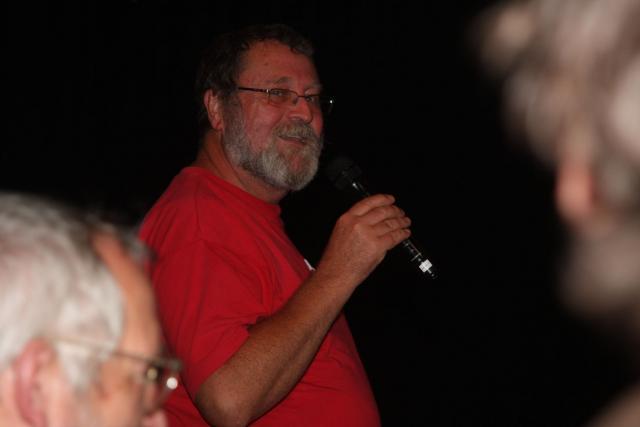
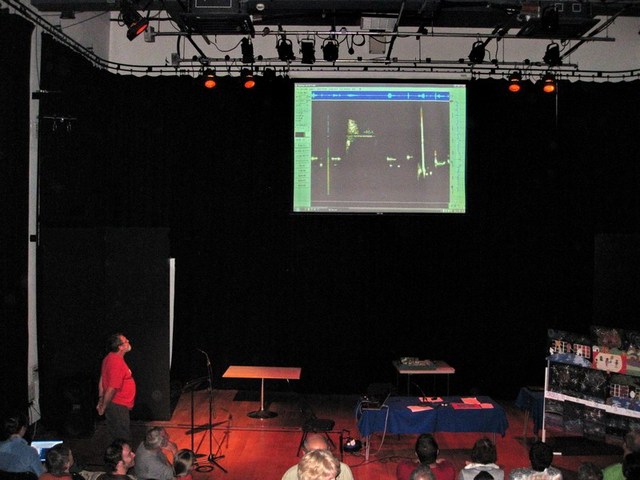
Jean-Louis Rault
photographed by
1. Bernd Brinkman (Germany)
2.Valentin Grigore (Romania)
Nagatoshi Nogami (Japan) continued
by presenting an ancient Chinese meteorite poem.
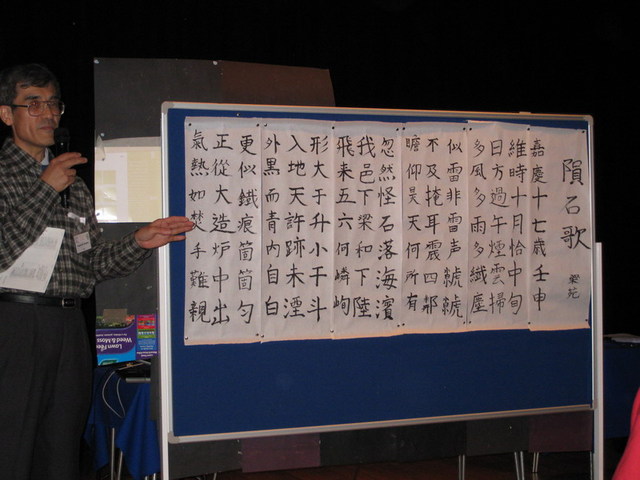
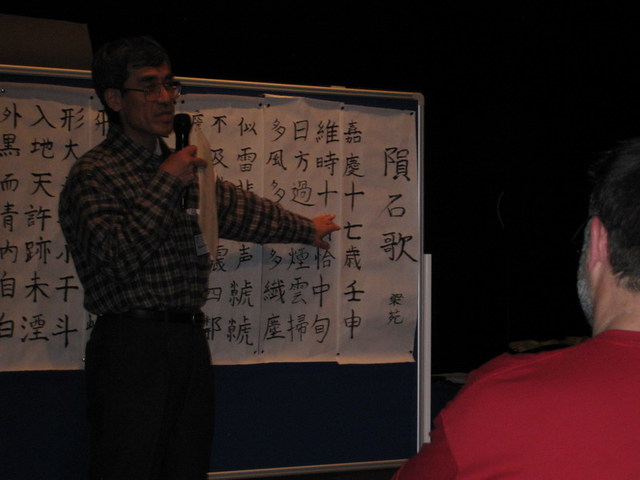
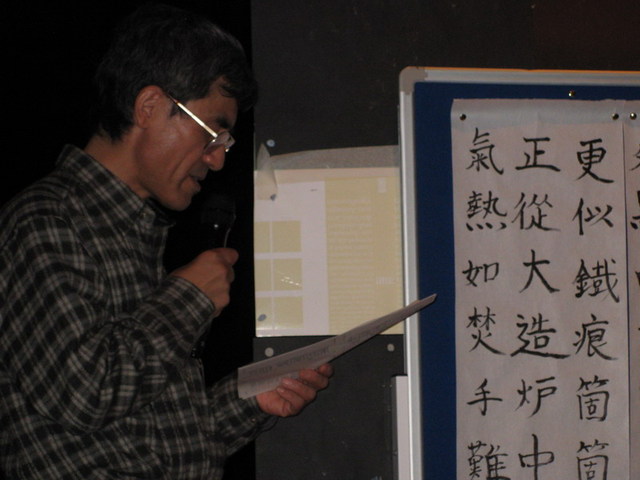
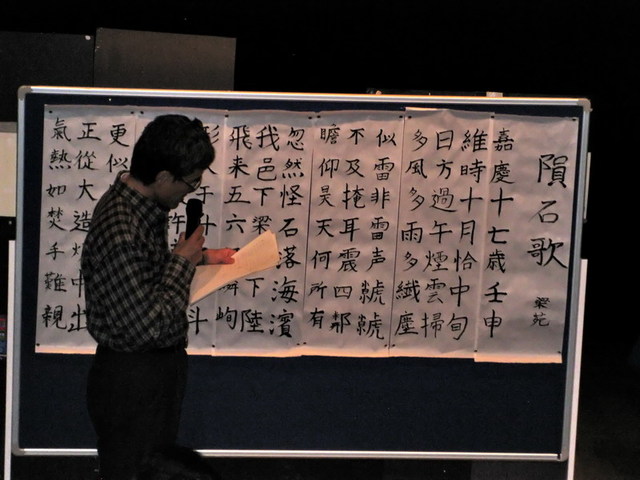
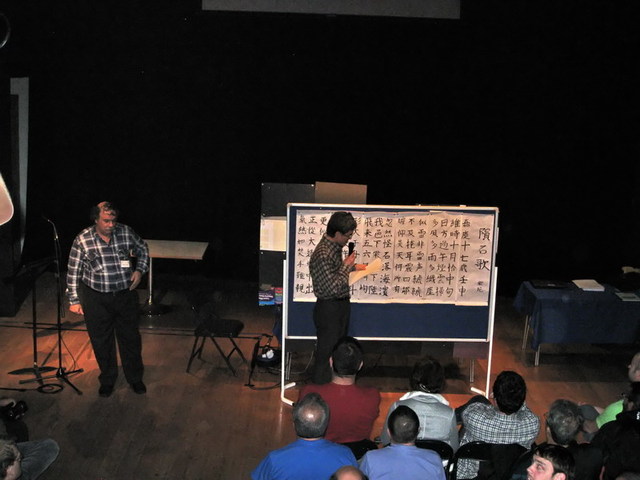
Nagatoshi Nogami
photographed by
Valentin Grigore
The director of the Astropoetry Show,
Andrei Dorian Gheorghe (Romania),
dedicated his contribution
to the memory of his mother, Steliana Gheorghe.
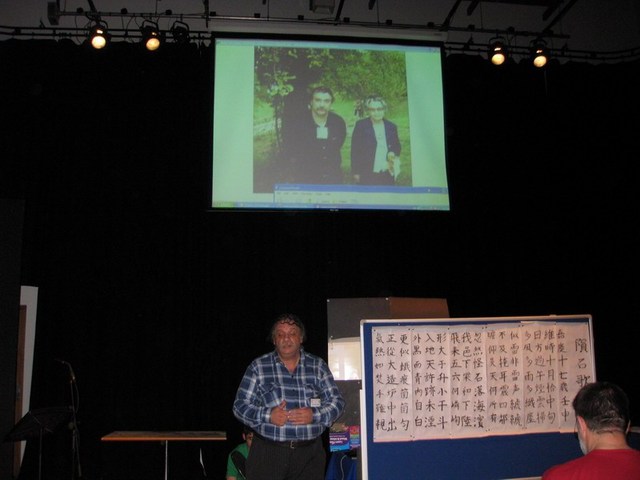
Andrei Dorian Gheorghe with a photograph of his mother
at the IMC 2000 in Pucioasa (Romania)
Photo: Valentin Grigore
Valentin Grigore (President of SARM, Romania)
presented a movie based on his photographs,
Perseids 2010 in Romania,
on the electronic music of teacher Petre Toma.
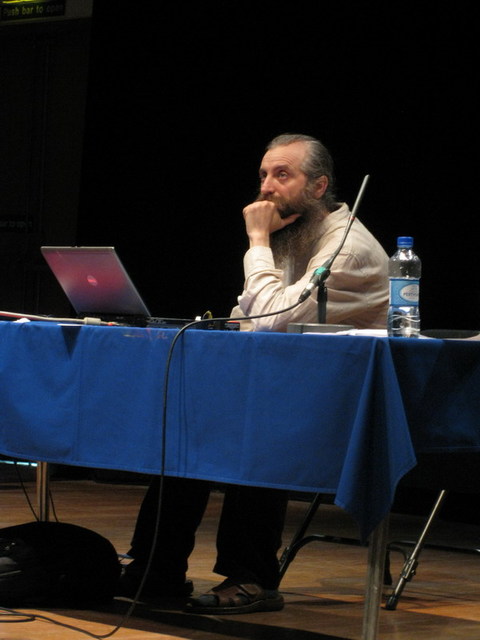
Valentin Grigore using the computer
photographed by Casper ter Kuile (Holland)
Andrei Dorian Gheorghe appeared again
doing an Irish jig and singing an Irish tune with his own verses:
I am a happy meteor
And I have to dance for you right now
I am a happy meteor…
The world could be so beautiful… wow!
(Andrei Dorian Gheorghe)
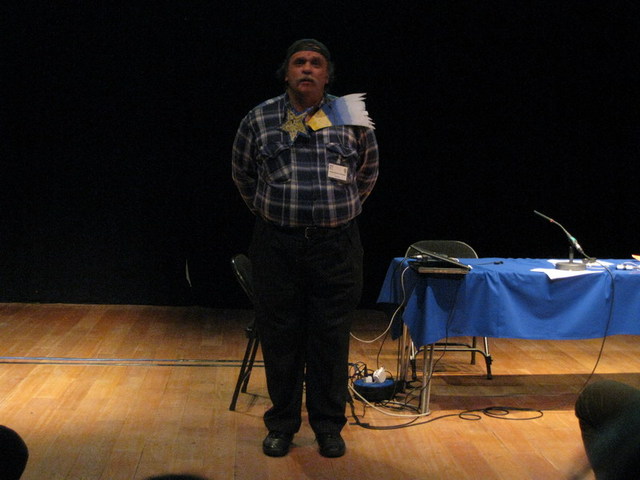
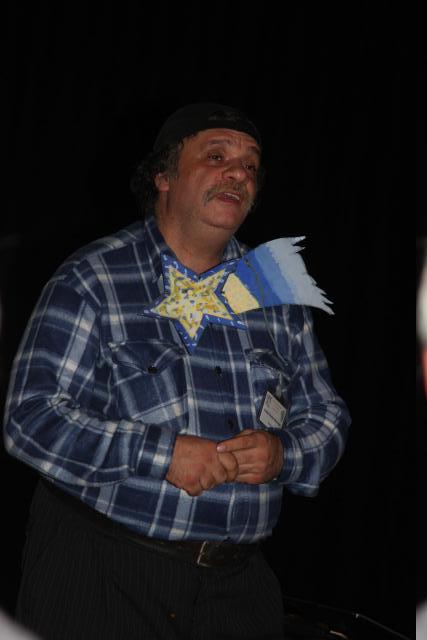
Andrei Dorian Gheorghe
photographed by
1. Valentin Grigore
2. Bernd Brinkman
The first part of the 14th Astropoetry Show ended with a gala act,
in which the great astronomer Jeremie Vaubaillon (Paris Observatory, France)
performed his Song (or rather Hymn) of the IMC
(launched at the IMC 2004 in Varna, Bulgaria)
with new lyrics,
accompanied by a multi-national team
(Jeremie, having injured his hand, could not play guitar,
so this was a beautiful sample of solidarity):
Silvain Bouley (France) - background vocals -,
Jonathan McAuliffe (Ireland, astronomer at the European Space Agency
in Spain) - guitar -,
Geert Barentsen (Belgium, astronomer at the
Armagh Observatory in Northern Ireland) - harmonica -,
and Antonio Martinez Picar (Spain, born in Venezuela) - drum.
THE SONG OF THE IMC - 2010
I found the people so friendly
for my first time at the IMC
It wouldn't be this funny
without the local committee
(chorus)
You're very welcome,
you're very welcome to the IMC
I fell in love with Shaun the sheep
For sure I’ll remember this trip
The drinking had had no limit
Teddy the bear did even bleat
(chorus)
You're very welcome,
you're very welcome to the IMC
I only have ten minutes
before the clock goes beep! beep! beep!
I can't believe that's already it
But the friendship has no time limit
(chorus)
You're very welcome,
you're very welcome to the IMC
This is so crazy, I couldn't guess
the headache it is to set up this mess
But at the end, I'm so happy
To have organized the IMC
(chorus)
You're very welcome,
you're very welcome to the IMC!
You're very welcome,
you're very welcome to the IMC!!!
-Jeremie Vaubaillon-
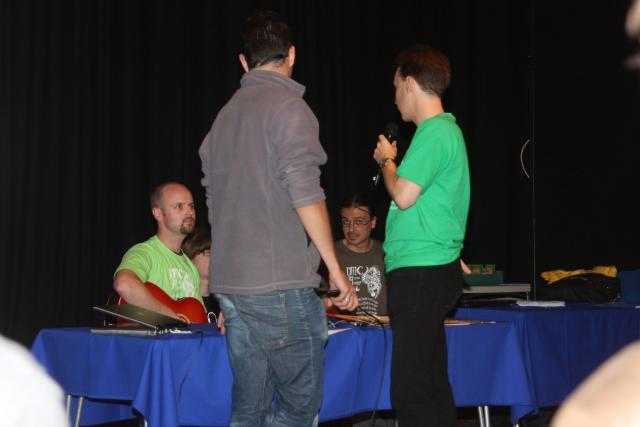
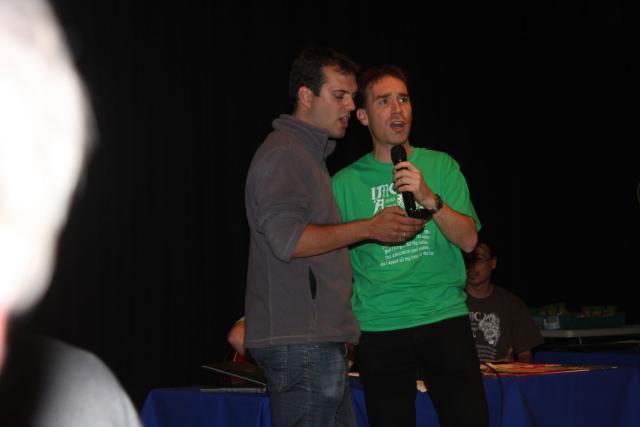
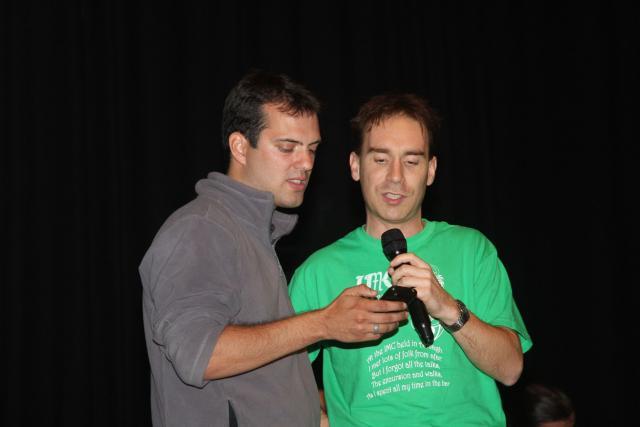
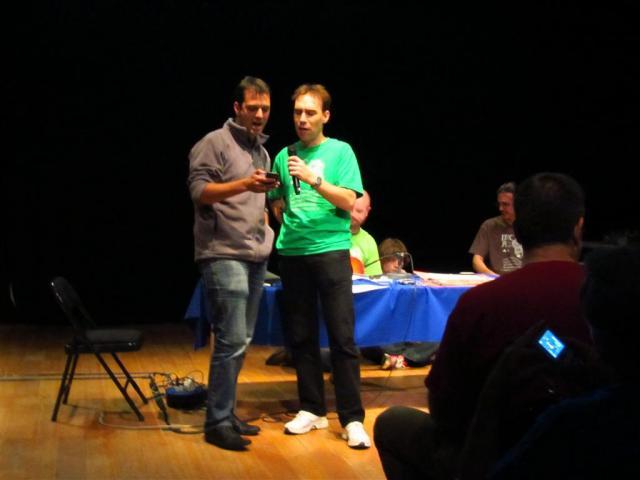
The Song of the IMC
photographed by:
1-3. Bernd Brinkman
4. Casper ter Kuile
The IMC participants changed venue and went to the
main hall of the Armagh City Youth Hostel
to continue the Astropoetry Show.
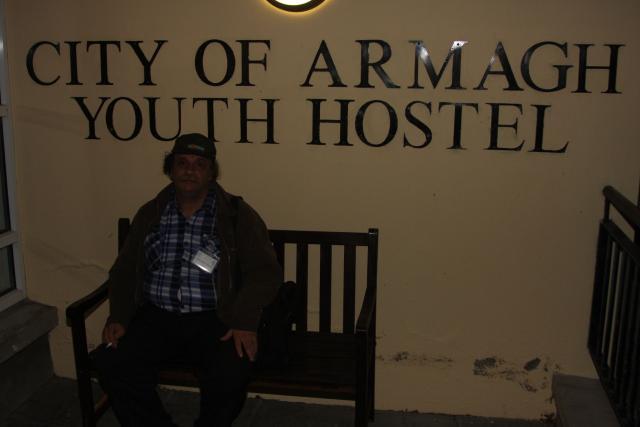
Andrei Dorian Gheorghe, prior to the second part of the Astropoetry Show
photographed by
Bernd Brinkman
At 23:00,
the showman, Andrei Dorian Gheorghe, reappeared
wearing a peaked cap from Royal Greenwich Observatory.
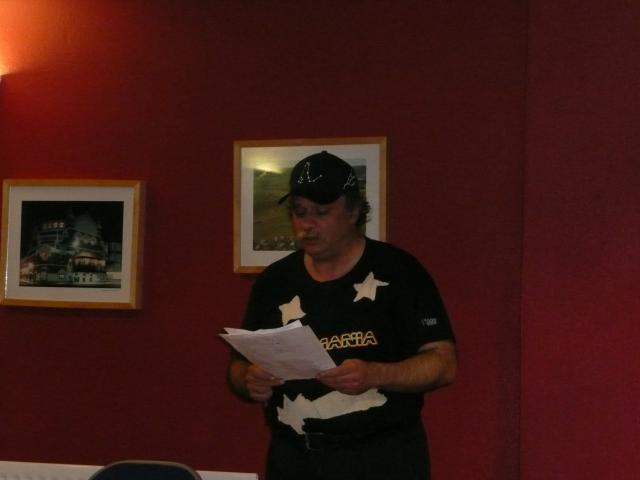
Andrei Dorian Gheorghe
photographed by
Paul Roggemans (Belgium)
Accompanied by the guitar of Stanislav Kaniansky
(Slovakia, astronomical observatory director in Banska Bystrica),
who played the theme from Stairway To Heaven
by Led Zeppelin,
Andrei Dorian Gheorghe read…
ASTROREQUIEM FOR STELIANA GHEORGHE
(1934 May 18 - 2009 October 1)
Every time between 1997 and 2009,
when the meteor lovers enjoyed
the Perseid shower,
I began to feel the quivers
of preparing a new Astropoetry Show
for the International Meteor Conference.
And only you knew this,
Mother…
Only you knew
about my sacrifices and my efforts
to translate the stars’ language
into poetry.
Only you knew
how hard it was for me
to defeat terrestrial obstacles
and to look for ideas
in the entire Universe.
Only you knew
about that exhausting concentration,
about my cosmic fever
to creatively contaminate
other sky lovers.
But it was so captivating
to do all these things,
Mother,
because I always felt your love
pushing me forward
just to create an astral tribune
for the sky lovers’ joy.
And it was fascinating
to do all these things
because I received the major recompense:
I met wonderful people.
But 2010 was the first year
when the Perseides came
and I didn’t see you
close to me on Earth.
In exchange,
I saw your face
in Mirfak, in Algol,
in Nova Persei 1901,
in the California Nebula,
in M34,
and in the Double Cluster,
saying to me
“Go on my dear son go on”
and your whispers,
Mother,
became tender meteors.
And now I understand,
Mother:
the duration,
intensity, magnitude and beauty
of an International Astropoetry Show
cannot be calculated,
because it is a human fireball
depending on the love
of the meteor lovers.
-Andrei Dorian Gheorghe-
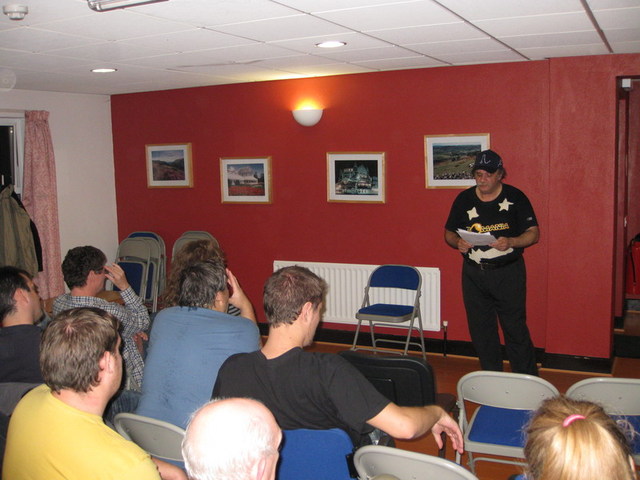
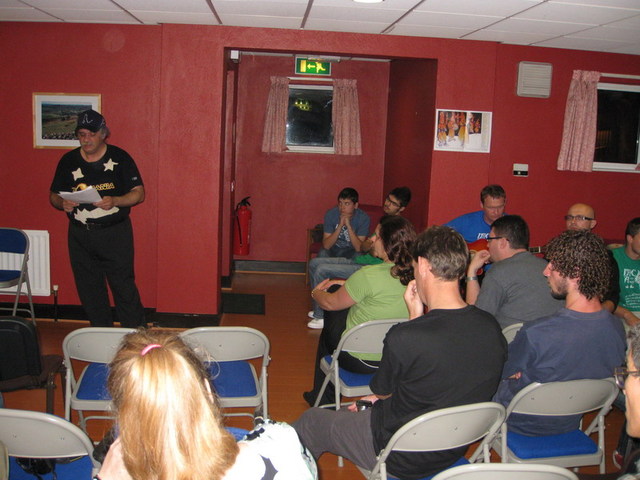
Andrei Dorian Gheorghe and Stanislav Kaniansky (clockwise from the right)
photographed by
Valentin Grigore
Lovro Pavletic (Croatia) performed a classical guitar piece.
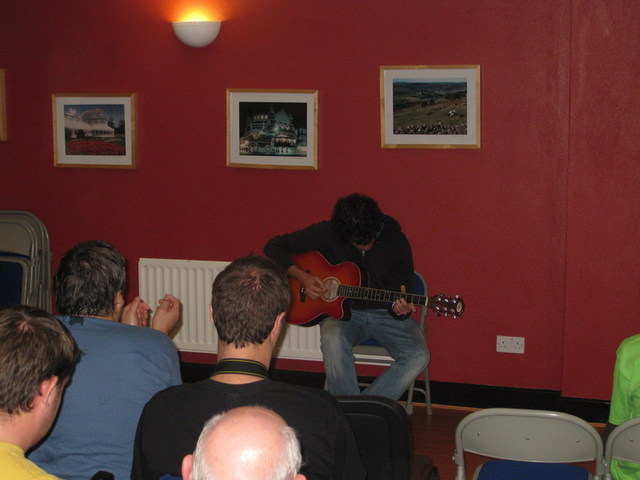
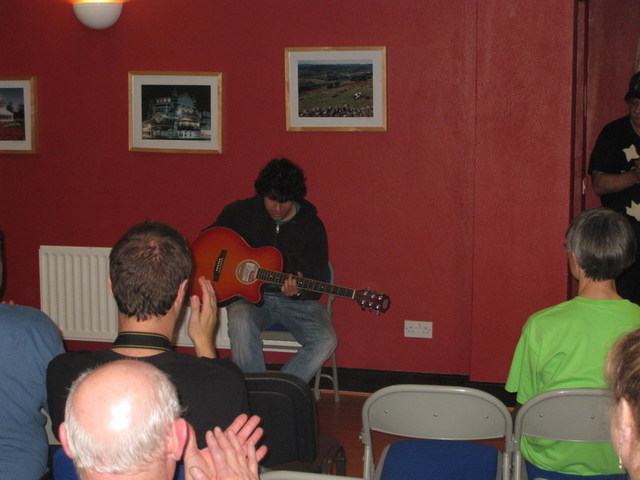
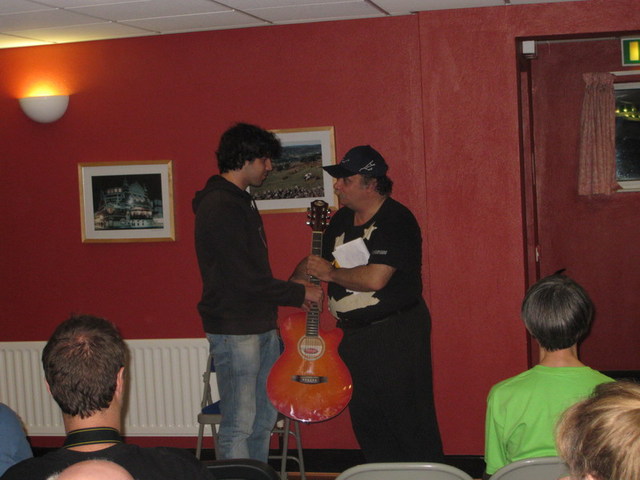
Lovro Pavletic
photographed
by Valentin Grigore
Then the main creator of the International Meteor Organization,
Paul Roggemans (Belgium),
presented two of his impressive meteor memories:
PERSEIDS 1993
After the Perseid outburst of 1991
and the discovery of the parent comet Swift-Tuttle
with another moonlight-disturbed outburst in 1992,
the IMO ran a press campaign to inform the public about the 1993 forecast.
News agencies and TV channels from around the world called IMO officers;
one of them, Peter Brown (Canada) was contacted by phone with a journalist
from the Washington Post asking if there was any danger for orbiting astronauts
or the space shuttle.
As Peter calculated flux data and impact probabilities on space structures,
he confirmed there was indeed a risk.
The journalist’s next question about what
precautions NASA was taking to deal with this threat,
Peter advised the journalist to contact NASA directly, which he did.
He was informed that since no meteor research program existed at that time.
NASA was somewhat embarrassed because they had not considered the possibility
of a threat from meteor storms since there had been none since the Leonids in 1966.
The troubling enquiry was carried to higher levels at NASA;
they contacted Peter to ask the details about the Perseid forecast
based on previous observational data from the IMO
and calculations made by Peter.
NASA re-analyzed the IMO data and came to the same conclusion,
that the threat was indeed real;
hence the planned launch of one the space shuttles
was delayed because of an expected Perseid outburst.
In addition, other satellites were maneuvered into secure orientations
to minimize impact risk.
Some satellites did get damaged proving that the threat wasn't just a theory.
The IMO also informed Russian space authorities
but for some reason they waited till the week following
the Perseid maximum to enquire what the IMO warning was about,
leaving their cosmonauts uninformed in the MIR station the entire time.
In 1993, no web-based reporting existed,
most observation teams were dropped in remote dark sky areas
that had limited communications facilities.
One year after its parent comet perihelion passage,
the intensity of the Perseid outburst
was subject to much speculation.
The IMO organized an instant data collection service to aid rapid reporting
in Puimichel (France) where a large team was at work.
Observing teams were asked to report meteor counts by phone to Puimichel
where the first raw data and impressions were collected by the author.
This first data was reported to Marc Gyssens in Belgium
who was able to rapidly analyze data and feedback by e-mail
and sent to IMO correspondents.
This was the first time IMO observing efforts were officially requested
by NASA and other institutes.
IMO global observing efforts and the VMDB-analyzing tool
got plenty of publicity at that time,
but it took many more years before current IMO online reporting service
and instant analyses set up by Geert Barentsen.
-Paul Roggemans-
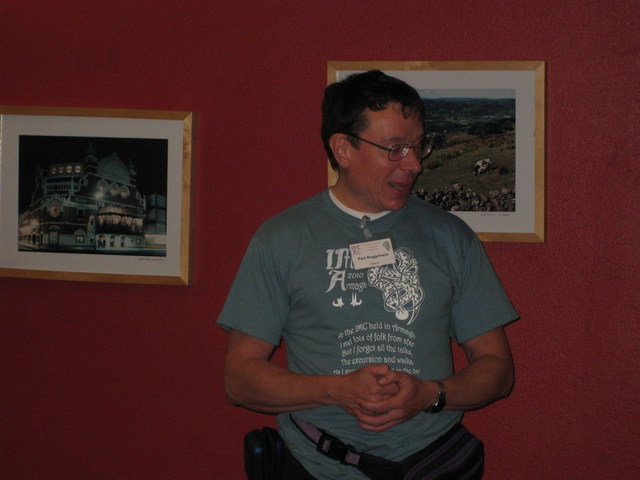
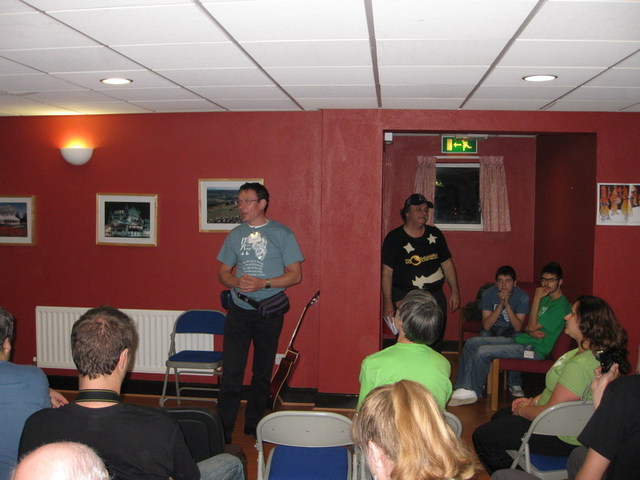
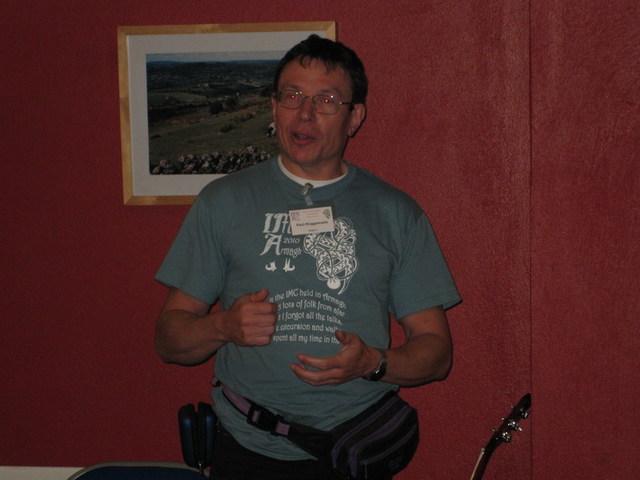
Paul Roggemans
photographed by
Valentin Grigore
DELTA AQUARIDS 1984
While in Florida (U.S.A.) and staying with local meteor observers,
the start observation was delayed since we had to wait.
I was eager to start observing.
Once we were finally began our observations,
we were joined by several cats in the garden,
who kept jumping on and off of us.
It appeared we had been waiting for these playing cats...
The reason was that often there were snakes in the garden
and only cats can manage to catch a snake without getting bitten.
-Paul Roggemanss-
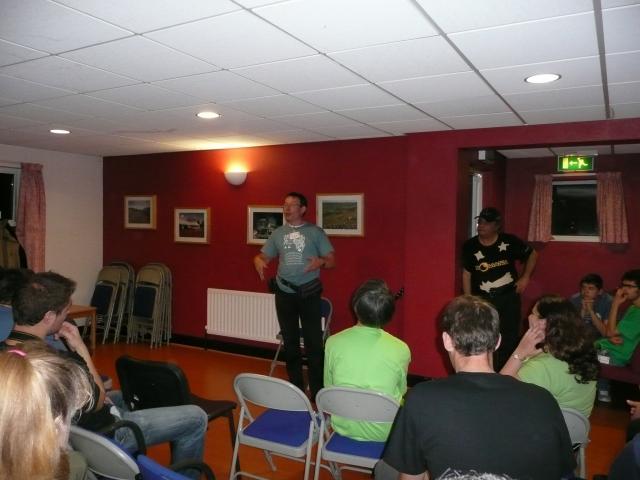
Paul Roggemans
photographed by
Adriana Nicolae (Romania)
The next act was a mini-comedy by Andrei Dorian Gheorghe,
dedicated to the December meteor shower Geminids,
in which the author was the Common (Meteor) Observer.
Cristian Daniel Grigore and Alexandru Sebastian Grigore (Valentin Grigore’s sons)
were the stars Castor and Pollux,
and Przemyslaw Zoladek (Poland) was the Drunken (Meteor) Observer.
GEMINIDS
Common Observer (to the world):
Every mid-December
meteor lovers await the Geminid shower.
Some of them resist by think,
other ones need something to drink.
Every mid-December
the Twin Brothers Castor and Pollux give a lesson of light.
It is so cold,
but they bring warm in the night
Common Observer (to the star Castor):
Hi Castor!
Castor (to the world):
Hi people.
We give you a meteor shower for your soul.
Common Observer (to the star Pollux):
Hi Pollux!
Pollux (to the world):
Hi people.
Please do not lose your control.
Common Observer (begins to sing):
These are not star wars
These are meteors
And if you want more
Love the meteor!
Drunken Observer (sings too,
but through his bottle because he is ‘under the influence’):
…meteor, meteor, meteor…
Common Observer (continues to sing):
To expand the role
Watch a fireball
You can take it all
Love the fireball!
Drunken Observer (still ‘inebriated’, also through the bottle):
…fireball, fireball, fireball…
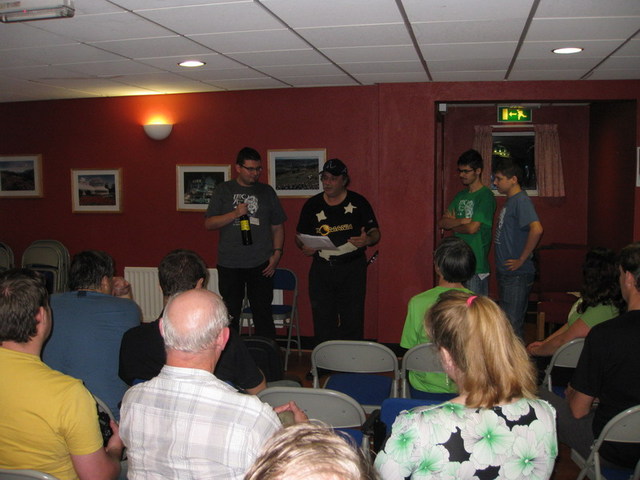
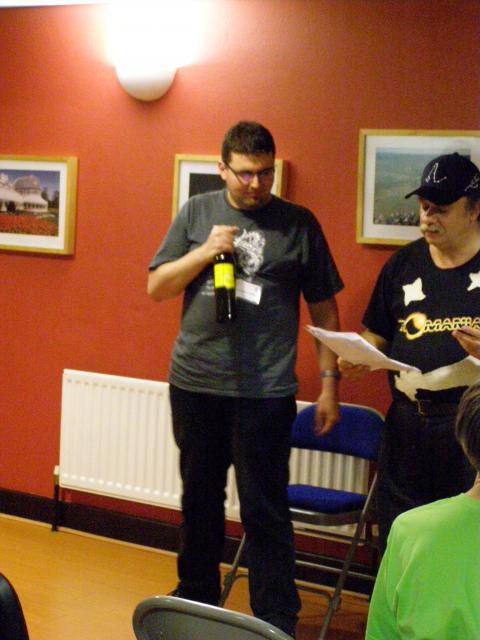
The Geminid Act
photographed by
1.Valentin Grigore
2.Adriana Nicolae
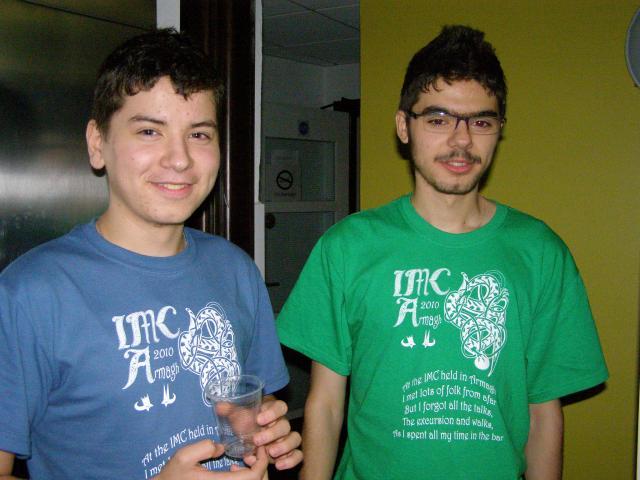
High school students Cristian Daniel Grigore and Alexandru Sebastian Grigore
10 years after they became the youngest IMC Astropoetry Show actors
during the IMC 2000 in Pucioasa (Romania)
Photo: Adriana Nicolae
The next moment belonged to David Asher and Miruna Popescu,
two beloved hosts from the Armagh Observatory.
David came back to the allegoric theme of the conference:
LIMERICK
At the IMC chaired by the sheep
Where the audience runs twenty rows deep,
When the chairman is ready
To hear the next teddy
You must stop, else the timer will beep.
-David Asher (Northern Ireland, UK)-
Miruna recited another limerick (written in 2007) by David Asher,
dedicated to the founder of the Astropoetry Show, Andrei Dorian Gheorghe:
One glorious I-M-O day
Was the time when a man called Andrei
Created a show
That's continued to grow.
Now you can't keep the audience away!
-David Asher-
And David recited (in Romanian) a limerick on sunspots by
Miruna Popescu (since she is a solar astronomy specialist)
written in her native language:
LIMERICK
(1. Romanian original version)
Ma-ntreb de ce azi nu sunt in stare
Sa vad nici o pata pe soare?
Ma uit in zadar!
E minim solar
Ori ma lasa vederea oare?
(2. English approximate translation by Andrei Dorian Gheorghe)
I wonder why I am not able
To see any spot in the sun.
All seems a vain fight.
So… is it a solar minimum?
Or… am I losing my sight?
-Miruna Popescu (Northern Ireland,
born in Romania)-
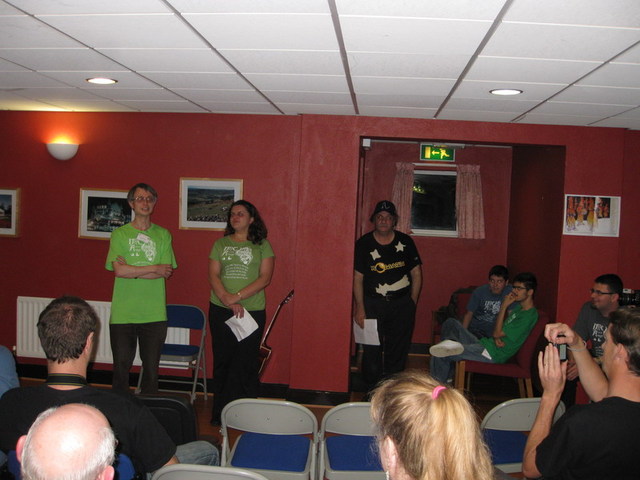
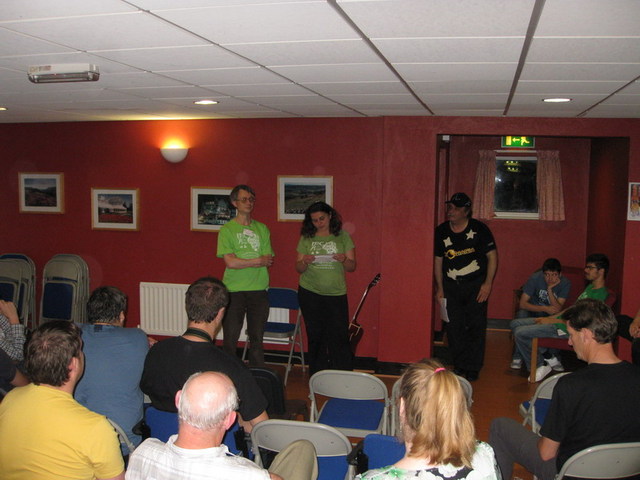
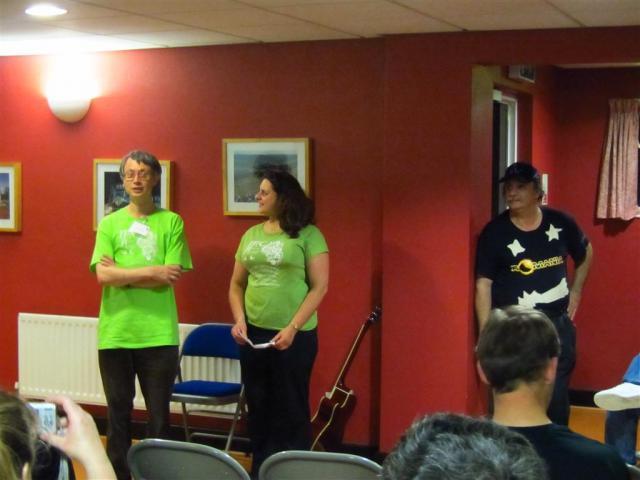
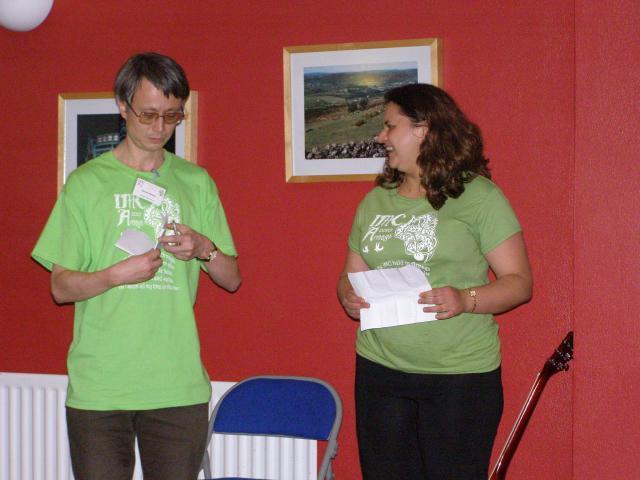
David Asher and Miruna Popescu
photographed by:
1-2. Valentin Grigore
3. Casper ter Kuile
4. Adriana Nicolae
Three other sky lovers
(Terry Moseley, Bernadette Foley and Seanie Morris)
continued to represent Irish astronomical poetry.
THE IRISH METEOR OBSERVER
I want to see some shooting stars
But all I do is sit in bars.
You want to know the reason why? -
I just can never see the sky
Maybe tonight the sky will clear -
It hasn't done so much this year!
But no, - I think I feel some rain:
All my hopes have been in vain.
But wait - I see the clouds are parting,
And the Quadrantids are starting:
I grab my coat and go outside
In time to see a bright bolide!
It has left a lovely train;
It makes me quite forget the pain:
I'll have to check the ZHR -
Tonight I'll skip the bloomin' bar!
.
-Terry Moseley (Northern Ireland,
past President of the Irish Astronomical Association,
former Director of Armagh Planetarium,
born in South Africa)-
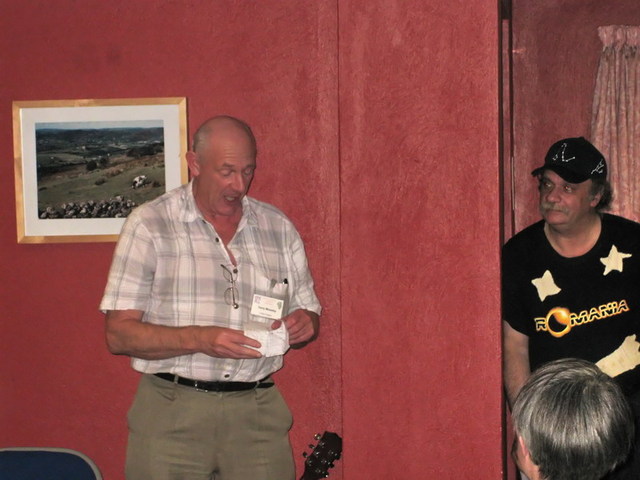
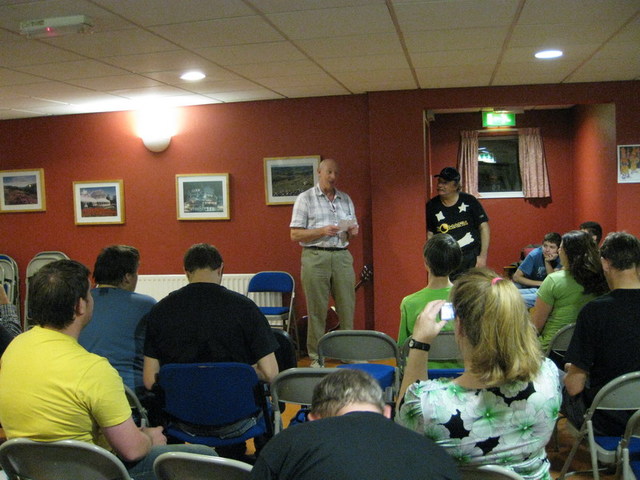
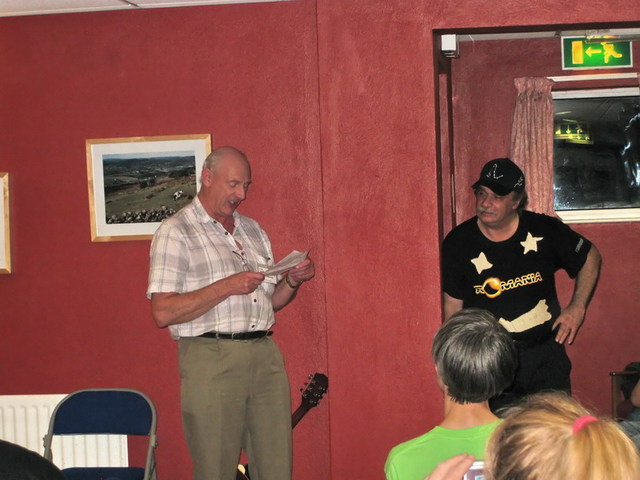
Terry Moseley
photographed by
Valentin Grigore
METEORITE HUNTING
Can you imagine my delight
When I found a meteorite?
A beautiful celestial stone
To call my very own!
So shiny, black and bright,
Falling from the starry night.
But:
Does it have a fusion crust?
Does it react to a magnet's touch?
Please: meditate and pause,
And reflect upon my cause;
For this stone I loved so strong
Turned out to be a meteorwrong.....
-Bernadette Foley (Republic of Ireland)-
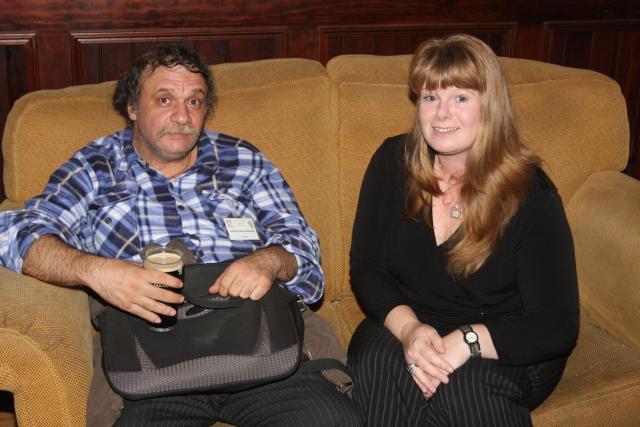
Bernadette Foley and Andrei Dorian Gheorghe at the IMC 2010 social evening
photographed by
Bernd Brinkman
MY FIRST TIME...
This IMO, it is my first
To help me quench my thirst
Of meeting that fellow astronerd.
With our heads above clouds
Shouting out loud
“Bollide!” “Fireball!” “No, it’s just a bird...”
Coming here, you see,
Making new friends, that was easy
As I have never been here before.
Memories I will keep
Of a stay fun and cheap
When I last close that hostel room door.
Coming from near and far
For the Sun, Moon and Stars
Looking for that something to cheer.
It has to be said
When all else is dead
It’s all down to the humble Meteor.
-Seanie Morris (Republic of Ireland)-
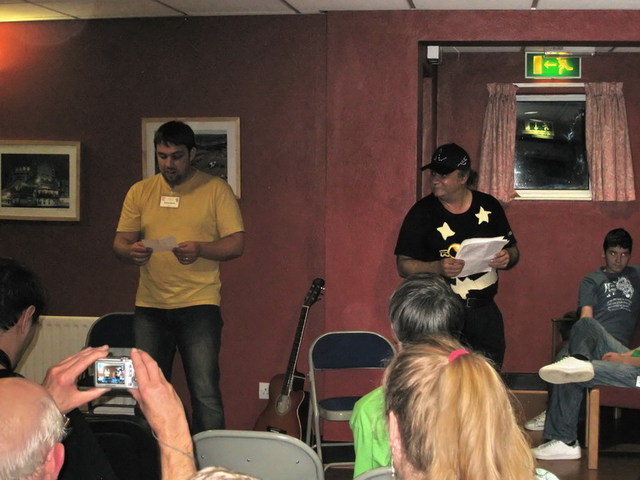
Seanie Morris
photographed by
Valentin Grigore
The Irish “program” was completed by
Jonathan McAuliffe - with vocals and guitar -,
who performed an Irish love song,
accompanied by Geert Barentsen - harmonica -
and Antonio Martinez Picar - drum.
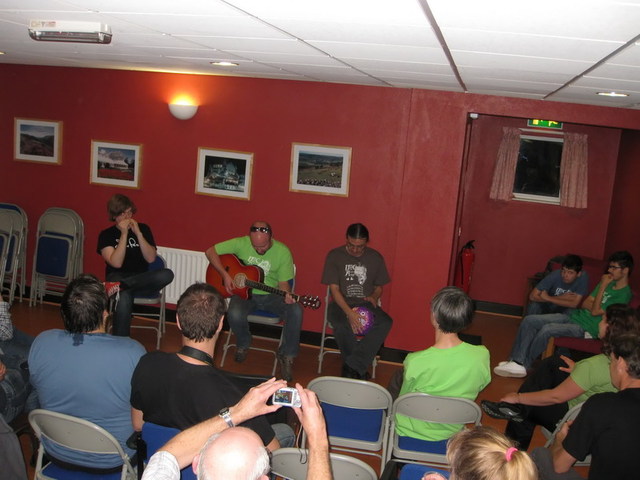
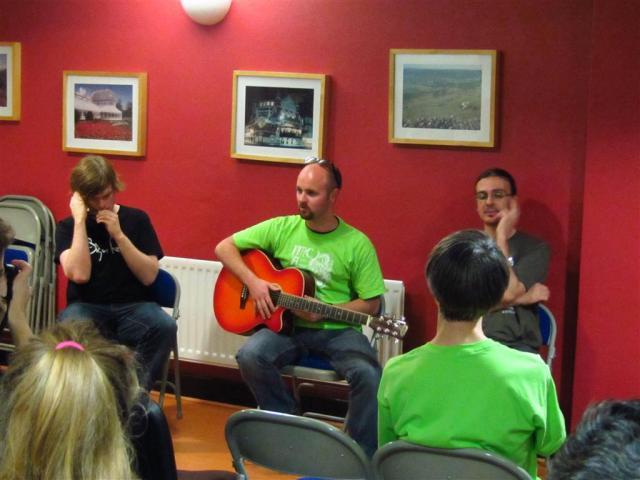
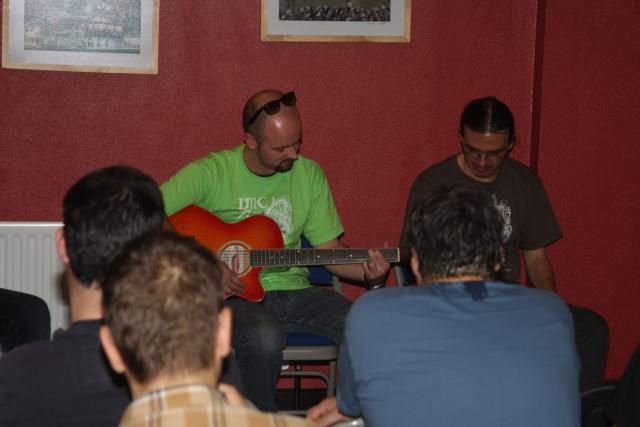
The Musical Act
photographed by
1. Valentin Grigore
2. Casper ter Kuile
3. Bernd Brinkman
Then the IMC participants welcomed
the return of Geoffrey Grayer (England, UK) to the Astropoetry Show
after two years’ absence:
I HAVE NOTHING TO SAY!
I'm sorry, I have nothing to say.
My muse has gone and flown away.
My mind is blank, my tongue is tied;
I feel as if my mind has died!
"What", you say, "has happened to you?
Are you lying, or is it true?
Normally you won't shut up!
Concentrate, and try your luck."
No, I can't; I'm stuck, I fear
(On my cheek, I feel a tear!)
Don't we all have days like this?
To stay in bed would be my wish!
"Come on, Geoff, you're an ideas man."
- Well, that would be my ideal plan.
But one can't always pick and choose
Sometimes one just has to lose!
Swift and Joyce, Wilde and Shaw,
Yates and Synge, and many more -
In the land which spawned their like
How can I pretend to write?
Maybe in this land of guile
Where I'm going to stay a while
And travel around on my own,
I'll go and kiss the Blarney Stone.
Well, now I've finished,
That is the end.
Should I do penance, become a monk?
Naah! I'm away to get dead drunk!
-Geoff Grayer
for the IMC-2010 Astro-Show-
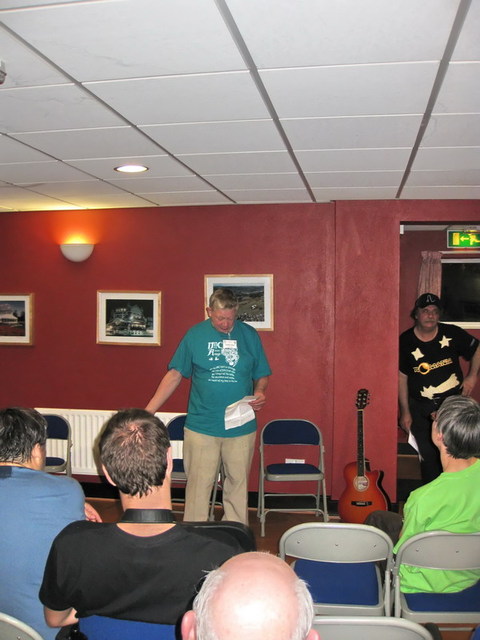
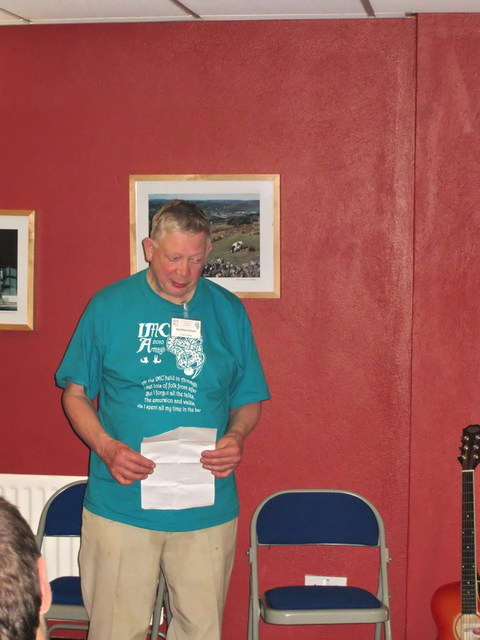
Geoffrey Grayer
photographed by
Valentin Grigore
After that Andrei Dorian Gheorghe tried to create an Elizabethan atmosphere
with his second mini-comedy, Perseid Meteor Race,
helped by
Antonio Martinez Picar and his drum (as the Heart of the Atmosphere).
The author played the Fat Fireball,
Valentin Grigore was the constellation Perseus,
Nastassia Smeets (Belgium) was the Moon,
Alexandru Sebastian Grigore, Cristian Daniel Grigore, Robert Pomohaci
and Adrian Pruna (all from Romania) were the Merry Meteors.
PERSEID METEOR RACE
(Merry Meteors warm up with drum sounds,
while Perseus arranges them for the race)
Fat Fireball:
People, people, ladies and gentlemen,
Perseus will liberate a new meteor shower.
It will be a great celestial race.
Who will be the brightest meteor?
Who will have the longest trace?
Moon (appears joyously):
Hello boys! I am the Moon.
Can I run with you?
Fat Fireball (authoritatively,
to the audience’s disappointment):
No Moon! Leave us alone please.
This race must be true.
(Perseus sounds the start,
the Merry Meteors run faster, but fall down one after the other,
while the Fat Fireball runs slowly and wins the race,
being acclaimed by the spectators.)
Fat Fireball (concludes):
You have to know that
I can fall down too,
Just like any other champion fireball.
Thank you!
(And of course he also falls down…)
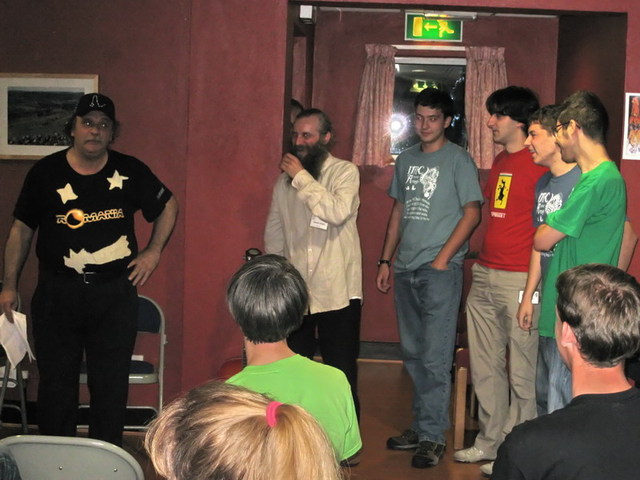
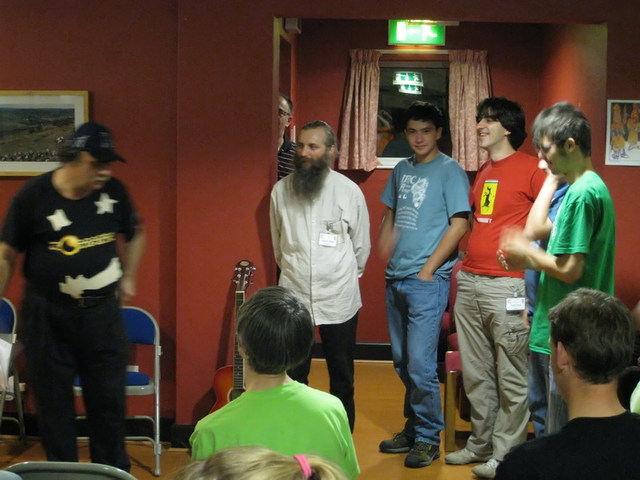
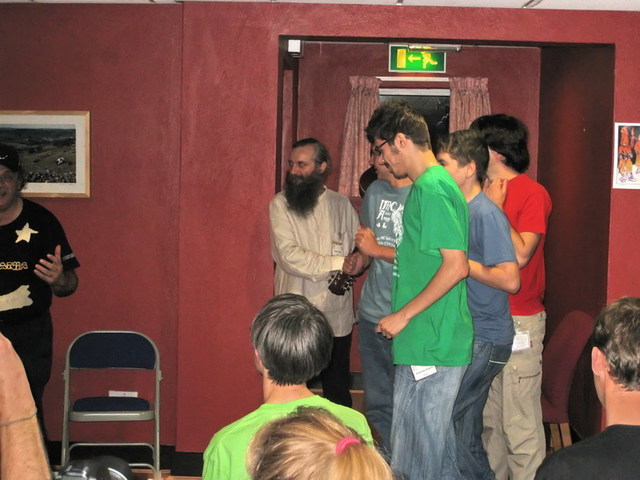
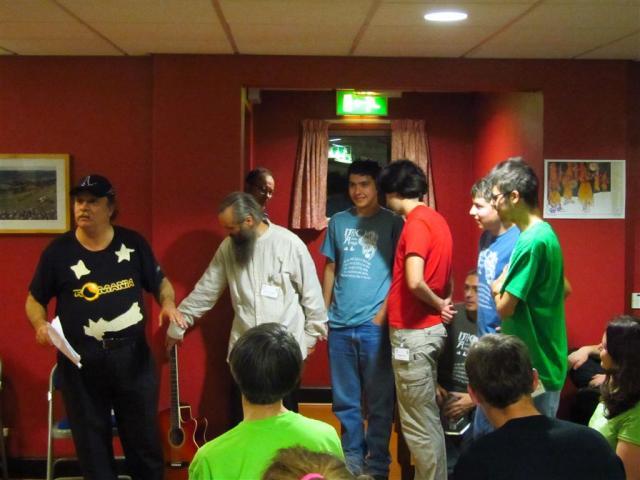
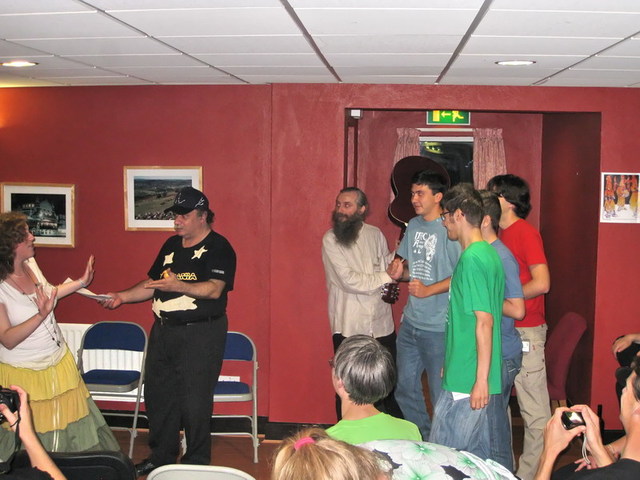
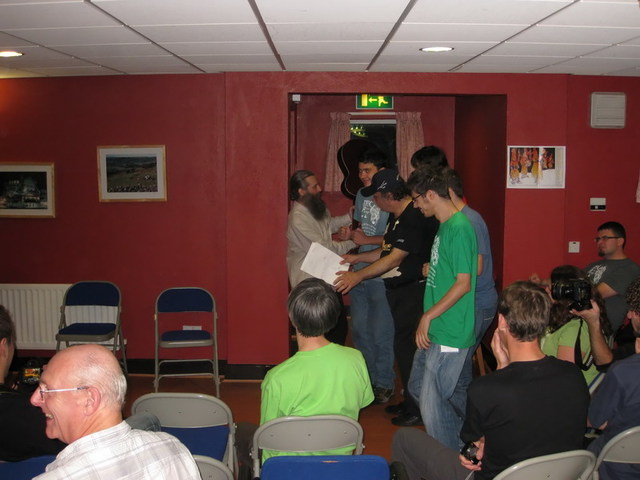
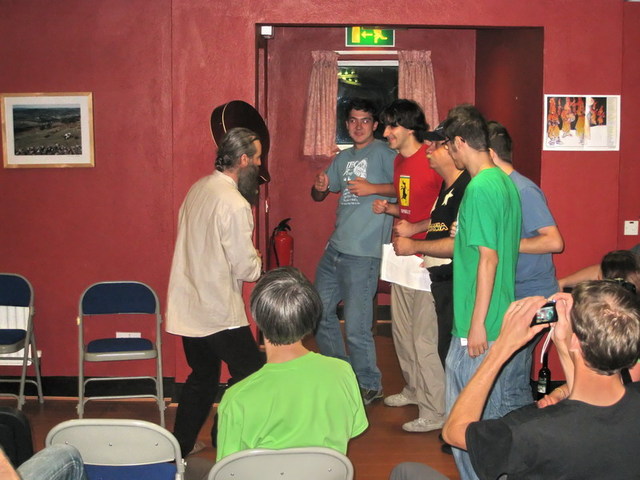
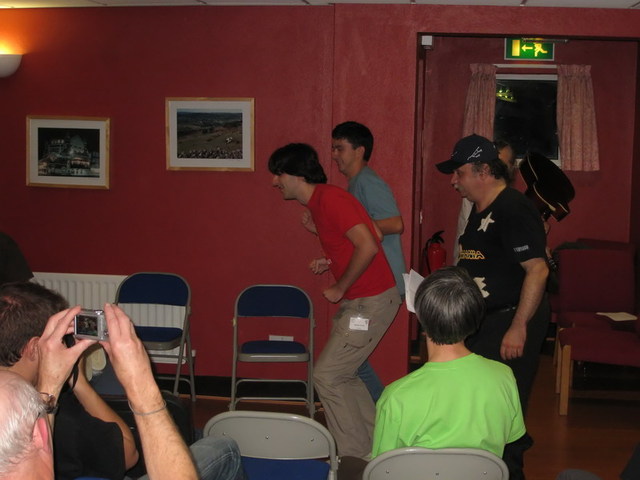
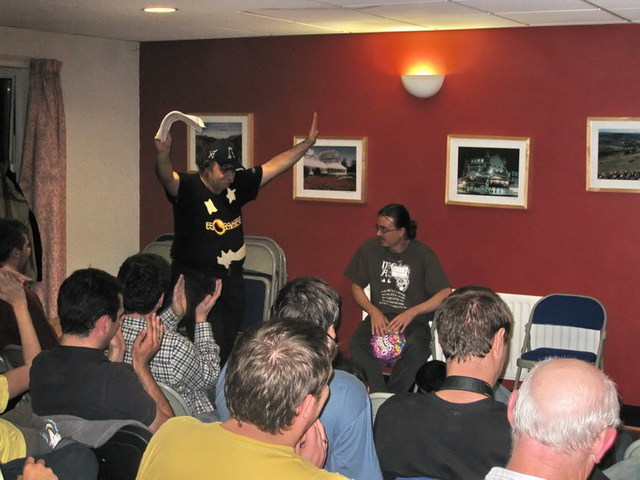
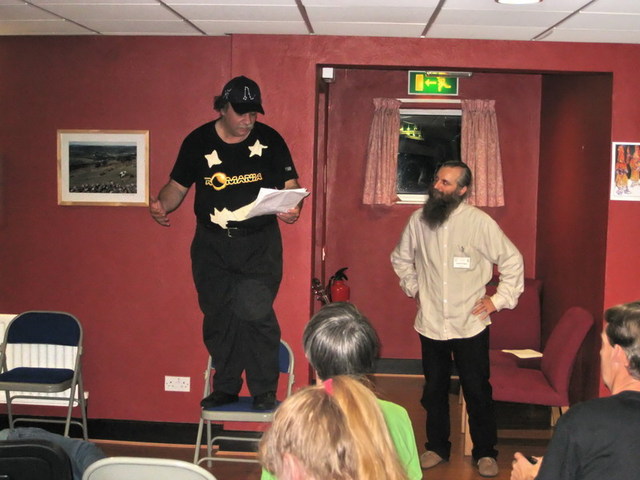
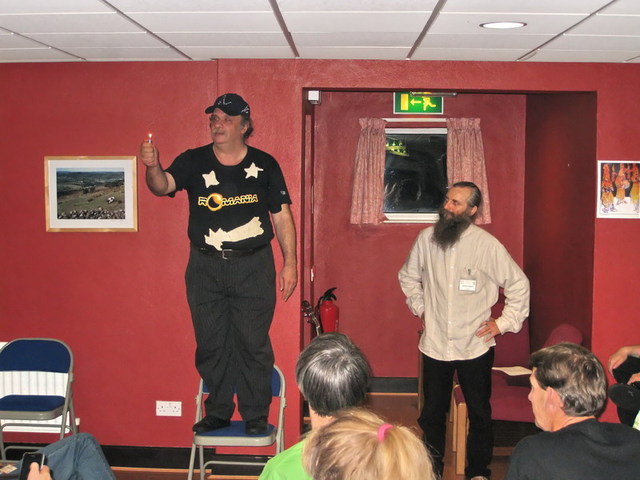
The Perseid Meteor Race act
photographed by
Casper ter Kuile
The mini-drama was followed by three Asian poetic moments, presented by
Galina Ryabova (professor at Tomsk State University, Siberia, Russia),
Nagatoshi Nogami (from the Nippon Astronomical Society)
and Suresh Bhattarai (Founding Secretary of the Nepal Astronomical Society):
HAIKU
On the sky-blue background
I see a white shooting star...
Oh, IMC Tee-shirt!
-Galina Ryabova-
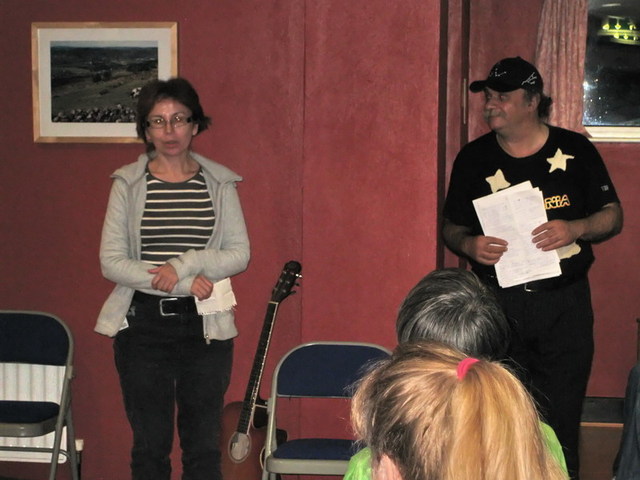
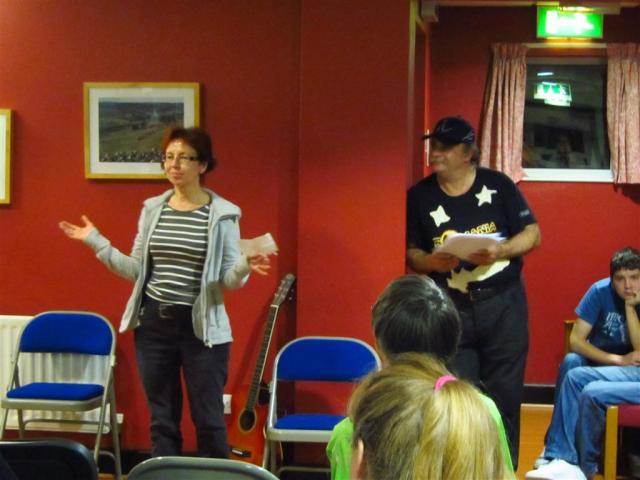
Galina Ryabova
photographed by
Casper ter Kuile
HAIKU
A half paint!
Talk thoroughly with glasses,
How short an autumn night.
-Nagatoshi Nogami-
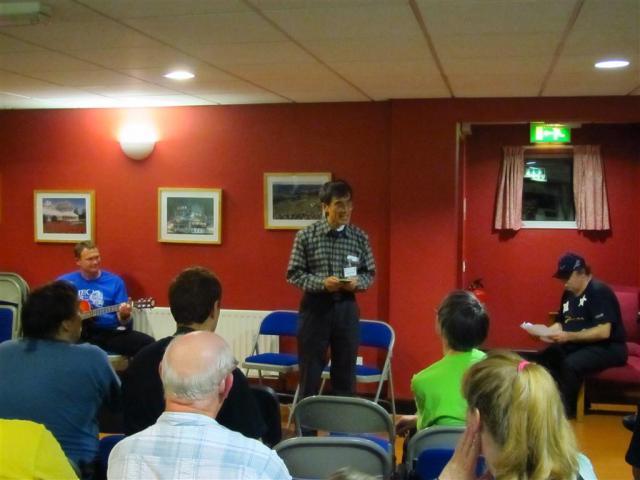
Nagatoshi Nogami accompanied by Stanislav Kaniansky
photographed by
Casper ter Kuile
METEOR
Oh meteor! where are you?
I'm searching for you
fascinated by your beauty
short but giving ever-lasting pleasure!
How could I forget our first date!
you were in the white dress
with flashing green and yellow lights.
Suddenly you were kidnapped
I hate those intense clouds
sorry I would not fight with that giant
you were disappointed with me!
since then i am getting my courage
looking for you and ready to fight
with the clouds!
suddenly it started to cry
and I got you again after a year!
-Suresh Bhattarai-
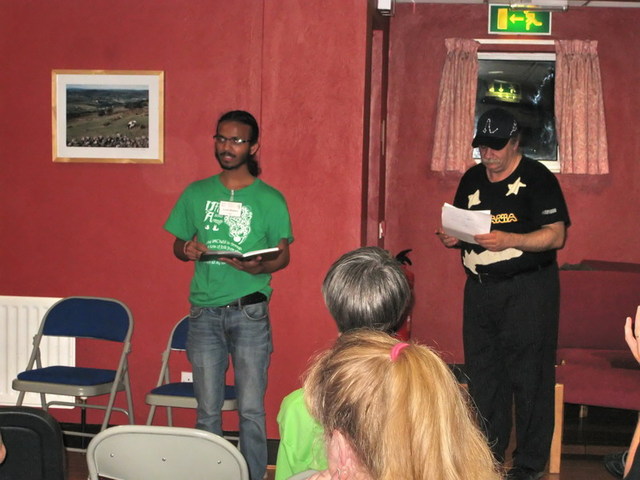
Suresh Bhattarai
photographed by
Casper ter Kuile
Then, the best voice of the IMC, Frans Lowiessen
(from the Royal Netherlands Association for Meteorology and Astronomy),
sang an old sailor song adapted for meteor lovers (accompanied by
Jonathan McAuliffe - guitar - and Antonio Martinez Picar - drum).
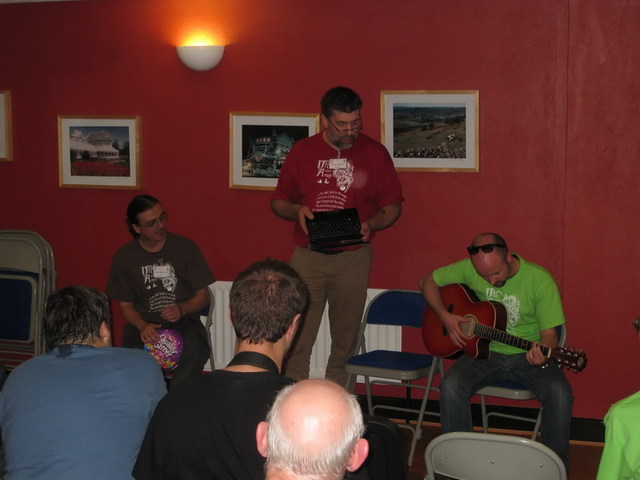
The Musical Act
photographed by
Casper ter Kuile
At the request of the public,
David Asher returned to the stage to recite a new limerick
(since we were in the country of this poetic species),
composed just a few moments before:
At the IMC that now has just passed
The work was incredibly vast
But it was all such great fun
As our very first one
(And unfortunately also the last).
-David Asher-
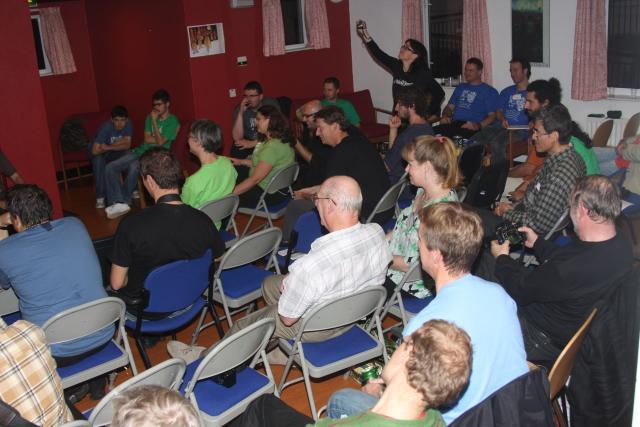
Sequence from the Hall during the Astropoetry Show
photographed by
Bernd Brinkman
In the third mini-comedy by Andrei Dorian Gheorghe,
the characters were three constellations:
with the author as Pegasus,
Valentin Grigore as Perseus,
and Adriana Nicolae as Andromeda.
The musical background was provided by
Stanislav Kaniansky on the guitar.
PERSEUS, ANDROMEDA, PEGASUS
Pegasus (apparently neutral):
Andromeda, who are you?
Certainly, you are a love beam.
Perseus thinks that you are true,
but Pegasus suffers under him.
(Then, as a respectable flying horse,
he carries Perseus on his back to Andromeda.)
Pegasus (exhausted, in front of Andromeda):
Perseus, show your love to Andromeda
through a meteor shower, or I die.
(Perseus throws confetti-meteors toward Andromeda.)
Pegasus (delighted):
Now I feel myself again
free to fly.
(He ends by emitting a happy neigh.)
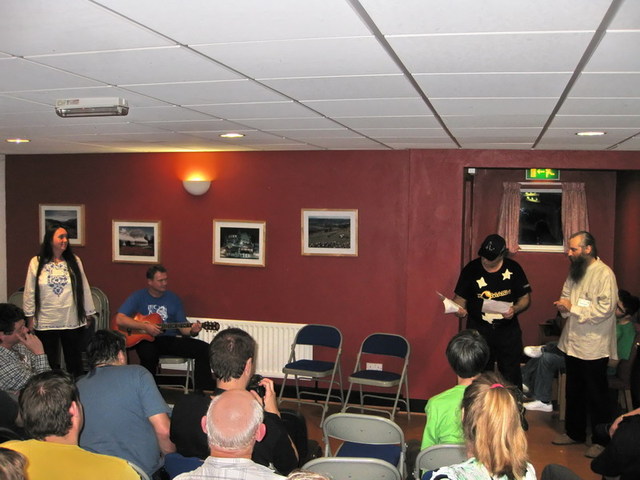
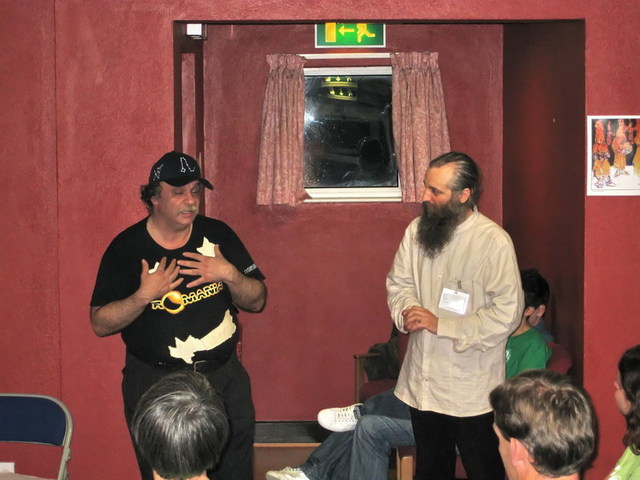
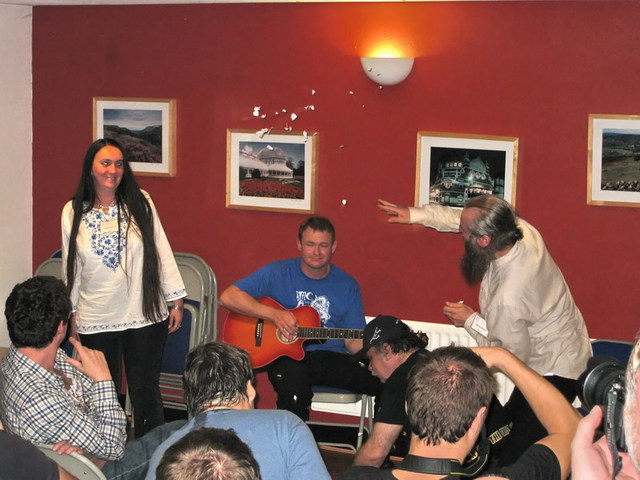
The Constellation Act
photographed by
Casper ter Kuile
Another IMC personality, Marc Gyssens (author of IMO Constitution,
former editor of WGN - the Journal of the IMO -,
head of Urania Public Observatory in Antwerp, Belgium;
in 2005 the International Astronomical Union named an asteroid after him)
gave a memorable speech:
IMO, ASTRONOMY AND FRIENDSHIP
One of the first big successes of the IMO goes back to 1988.
Upon analyzing the activity profile, Paul Roggemans
discovered a small, secondary peak.
He tried to find arguments to reason this peak away to
be able to dismiss it as an artifact,
but the arguments worked in favor of the reality of the peak
rather than the other way around.
Paul's conclusions met a lot of criticism,
but the 1989 Perseid profile showed the peak again
at more or less the same position in solar longitude,
this time however, beyond any doubt and well above
the level of statistical fluctuations.
Because of the full moon, 1990 was a bad Perseid year,
but in 1991, Paul warned the Japanese via Sky & Telescope for
enhanced activity around the time of the new peak.
Japanese amateurs, who suffer from high levels of light pollution,
went out of their way to find an excellent observing position
up in the mountains
and were treated to an outburst.
At the same time,
there was the problem with the rediscovery of the comet
now known as 109P/Swift-Tuttle,
whose return was expected in the 1980s.
Enhanced Perseid counts seemed to confirm this,
but the Comet was not found.
However, amateurs uncovered an old "prediction" by Brian Marsden
from under the dust suggesting that Swift-Tuttle
might be identical to Comet 1737 II Kegler,
implying that the Comet would only reappear in 1992.
Marsden added that he would be the most surprised
if his suggestion turned out to be true,
but amateurs took it seriously,
especially after the recurrence of the Perseid outburst in 1992,
and the Comet was rediscovered.
I think it is fair to say that the IMO may take partial credit
for the rediscovery.
Certainly, this succession of events may be
the first major success of the IMO.
Since then, many successes followed.
The people involved formed a tight network,
reinforced each year through the annual IMC.
The ease and naturalness of it
may mislead us in taking all of this for granted.
My point now is that we should not take this for granted.
The international network of good friends striving toward a common goal
is indeed driven by the ambition of individuals to achieve new results,
to explore new avenues of observing and research,
and to get the most of out it.
Friendship, however natural it seems, requires a common theme,
and in our case, this common theme is meteors.
So, let us continue to be ambitious about our science,
and our friendship will flourish too,
for many, many IMCs to come!
-Marc Gyssens-
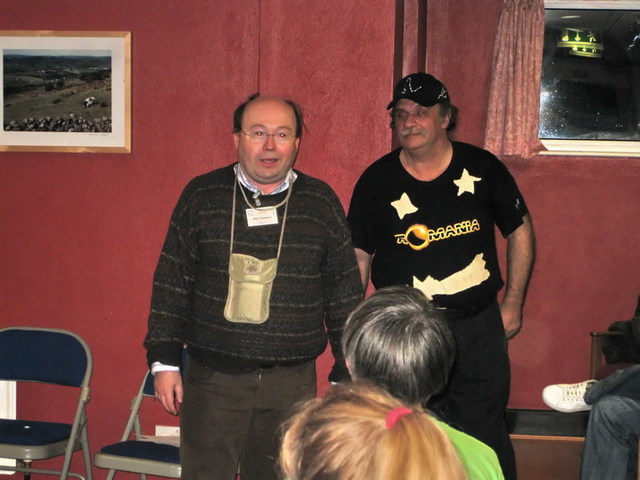
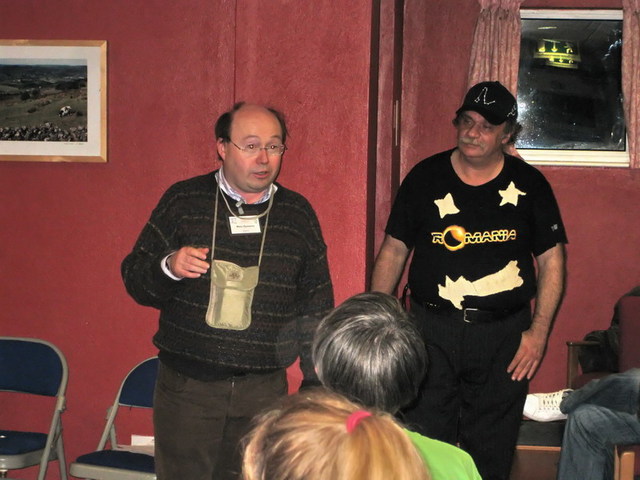
Marc Gyssens
photographed by
Casper ter Kuile
The last musical presentation belonged to Antonio Martinez Picar and his drum,
playing Meteorite Fall on the Moon 2
(two years after he had played Meteorite Fall on the Moon 1
at the IMC 2008 in Sachticka, Slovakia).
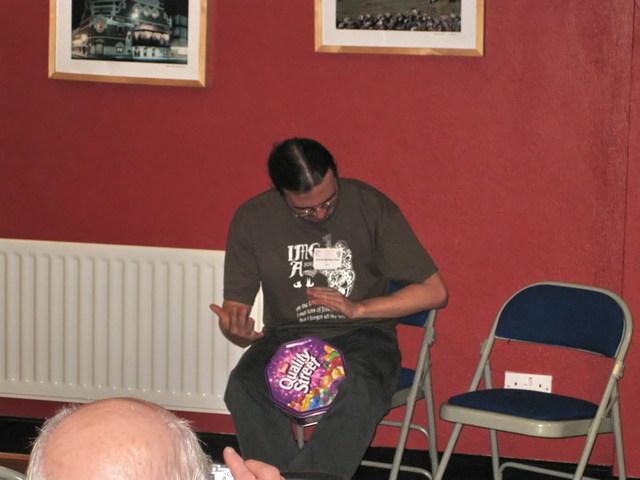
Antonio Martinez Picar
photographed by
Casper ter Kuile
The final act of the Astropoetry Show 2010
was an international collective improvisation
(involving participants from 9 countries and from 3 continents).
It was based on a question put forth by Andrei Dorian Gheorghe
as the Atmospheric Responsible
(for this role he borrowed a “constellated” umbrella from Staniskav Kaniansky
- as the meteors seem to come from constellations)
and the metaphoric and victorious replies from 11 Personified Meteors
from major meteor showers.
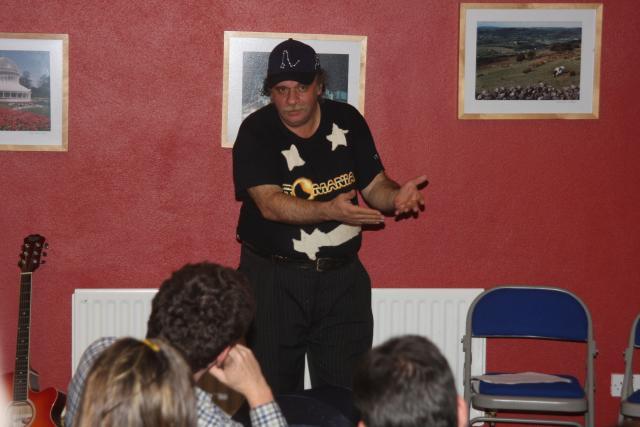
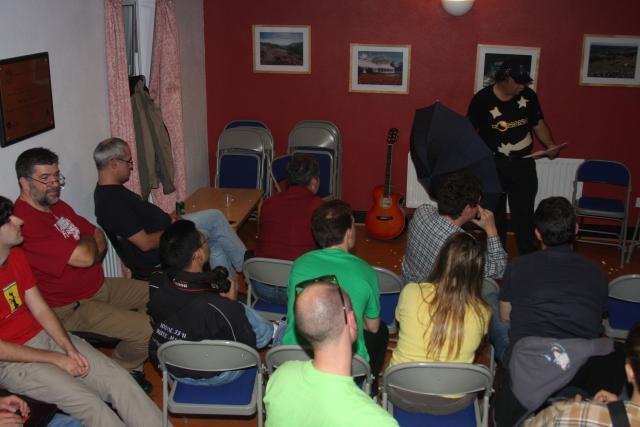
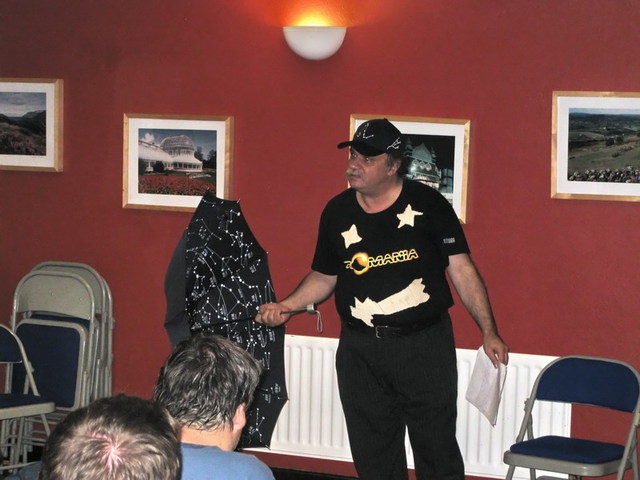
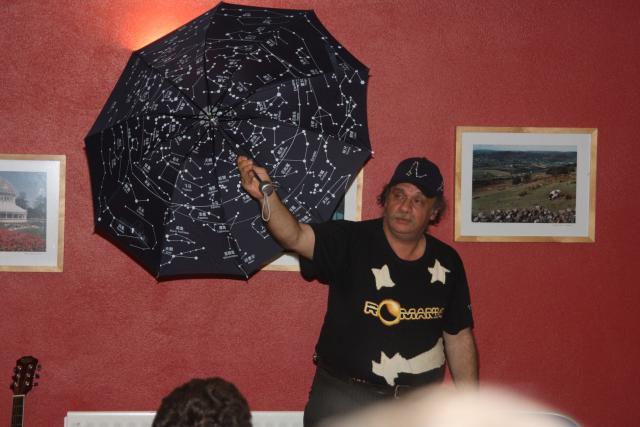
Andrei Dorian Gheorghe (Romania) and the “constellated” umbrella
photographed by:
1,2,4. Bernd Brinkman
3. Casper ter Kuile
ENTERING THE ATMOSPHERE
Atmospheric Responsible:
Why do you want to enter the atmosphere,
Quadrantid Casper ter Kuile?
Casper ter Kuile (Holland):
I’d like to be admired by people
as the first who opens the New Year…
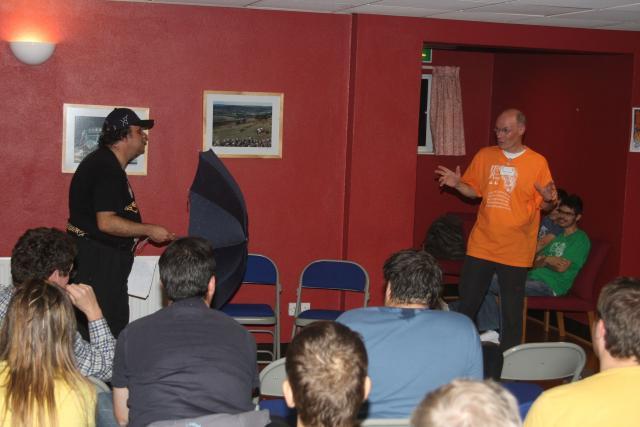
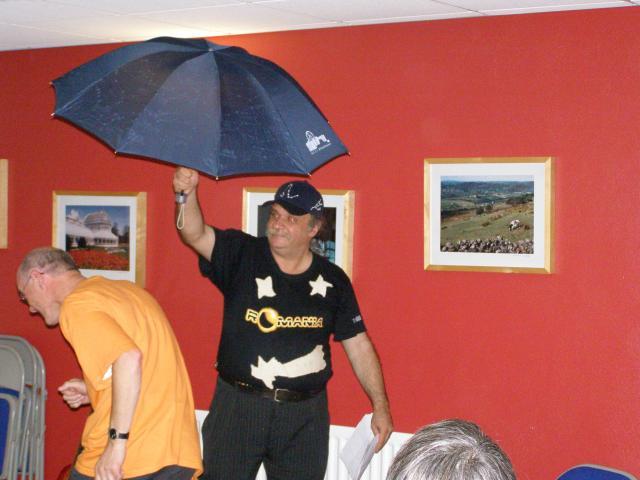
Casper ter Kuile
photographed by
1. Bernd Brinkman
2. Adriana Nicolae
Atmospheric Responsible:
Why do you want to enter the atmosphere,
Lyrid Grigoris Maravelias?
Grigoris Maravelias (Greece):
I have been wandering for a long long time in the space
and, you know, it is so cold and lonely out there...
So I would like to get a little warmer...
If you let me pass
I will enter Earth and warm up
and, perhaps, I will meet these amazing people from the IMC,
who will give me another warm welcome...
what do you say ??
should I ...?
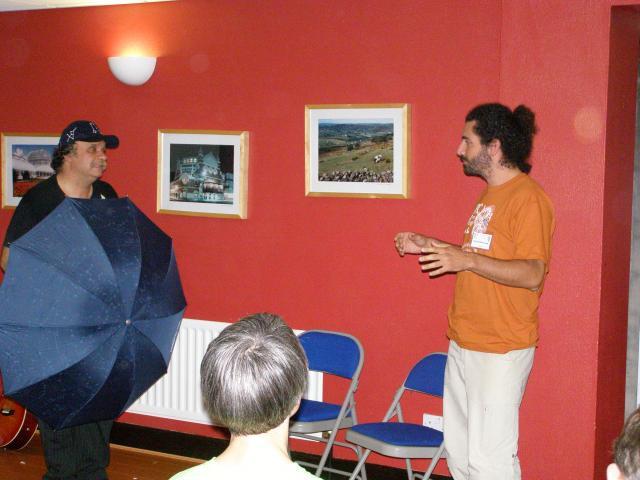
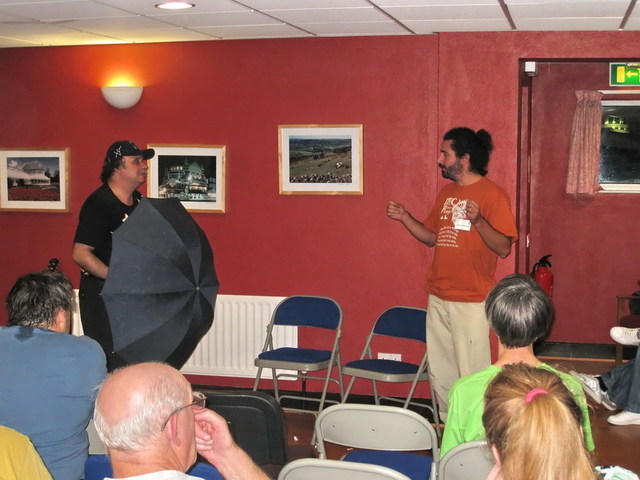
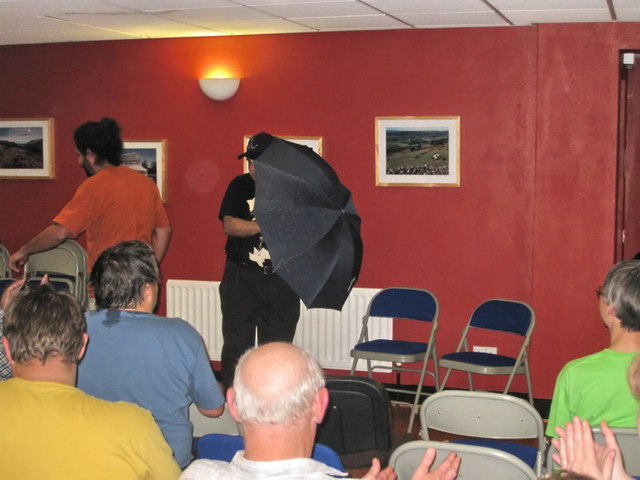
Grigoris Maravelias
photographed by
1. Adriana Nicolae
2-3. Casper ter Kuile
Atmospheric Responsible:
Why do you want to enter the atmosphere,
Eta Aquarid Arnold Tukkers?
Arnold Tukkers (Holland):
I’d like to see how stupid
some of the Dutch meteor observers are…
And Arnold Tukkers is just
the most stupid of them!
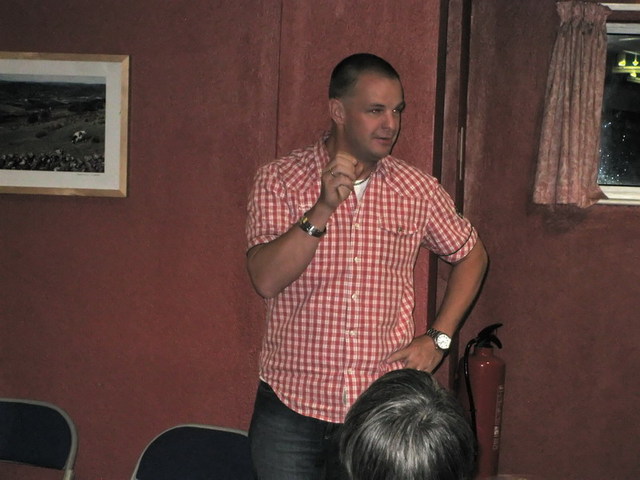
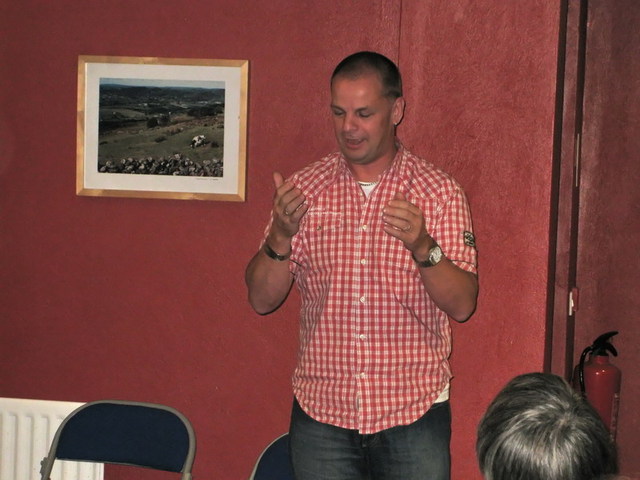
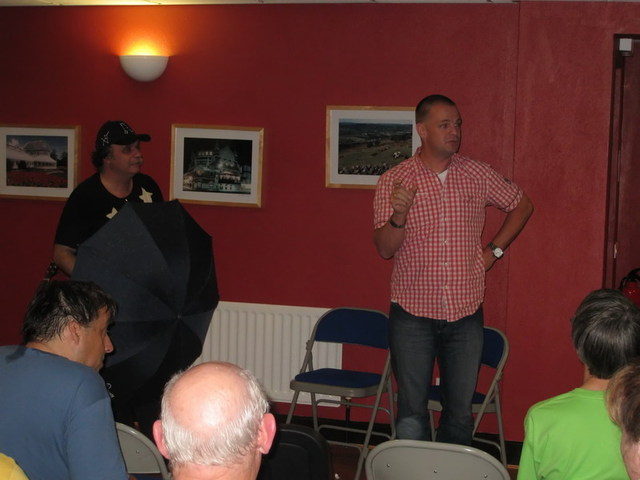
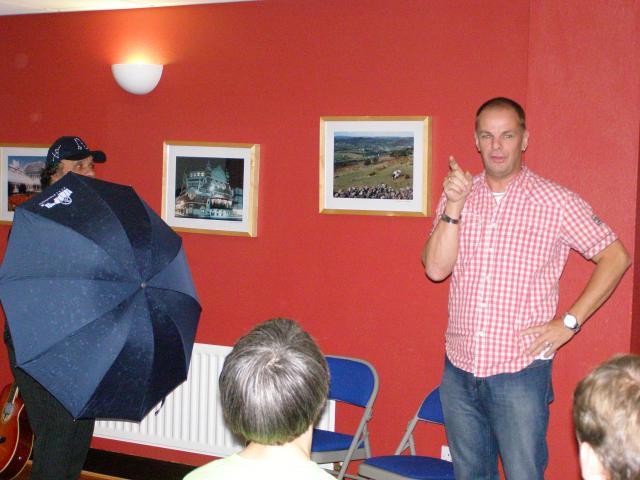
Arnold Tukkers
photographed by
1-3. Casper ter Kuile
4. Adriana Nicolae
Atmospheric Responsible:
Why do you want to enter the atmosphere,
Alpha Capricornid Detlef Koschny?
Detlef Koschny (Germany/Holland):
Because for at least one short moment in my life
I want to look like a bright guy.
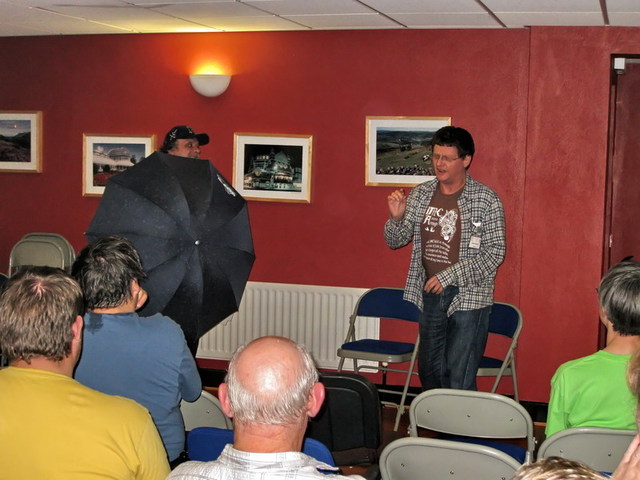
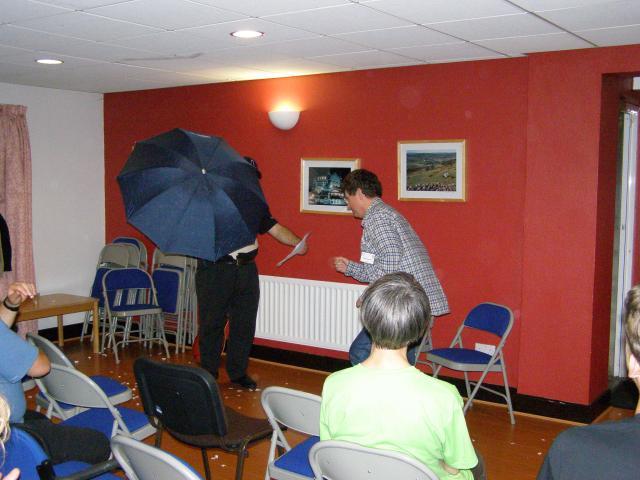
Detlef Koschny (astronomer at
the European Space Agency in Holland; born in Germany)
photographed by
1. Casper ter Kuile
2. Adriana Nicolae
Atmospheric Responsible:
Why do you want to enter the atmosphere,
Perseid Hans-Georg Schmidt?
Hans-Georg Schmidt (Germany):
The Perseid
I will be of magnitude Zero
I was sent out by a classical hero.
I am important, I am fast, I am hard:
I WILL TEAR THAT BLUE PLANET APART!
But what’s that? Sudden heat is churning!
I´m on fire, I´m exploding, I´m burning!!
I feel terribly overheated:
THAT PLANET WILL HAVE ME DEFEATED - AAAAaaaaaa…..
(Explanation:
A small piece of debris is approaching the earth out from the direction
of Perseus-Constellation.
Perseus is a very important hero in classical tales, indeed!
Out of that the tiny particle derives a pretty wrong self-assessment.
It even feels strong enough to cope with that blue planet,
which is crossing its path.
But the closer our heroic Perseus-splinter approaches the earth,
the worse becomes its fate - it explodes and bursts into fire eventually.
And there are some people who also look rather tiny physically and/or mentally,
but feel a very similar self-confidence as our small piece of debris showed.
This megalomania can be dangerous, it even could lead into self-destruction,
to suicide…..)
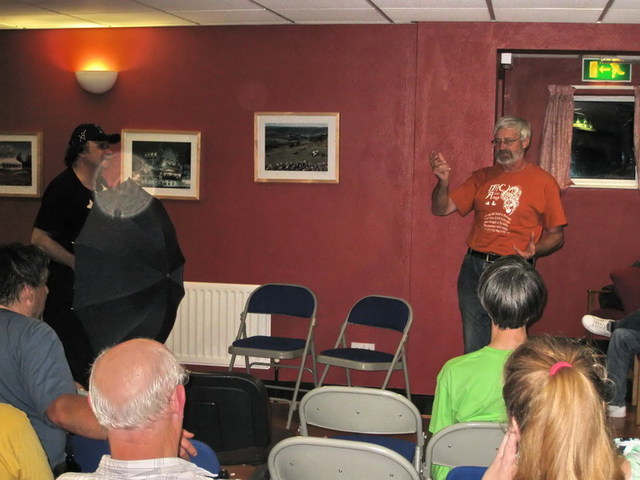
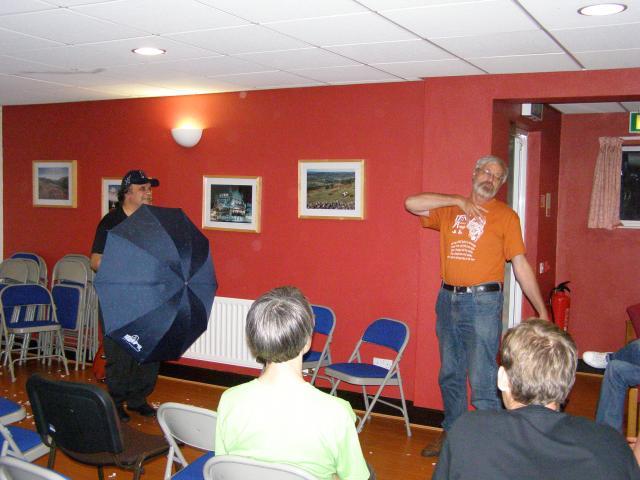
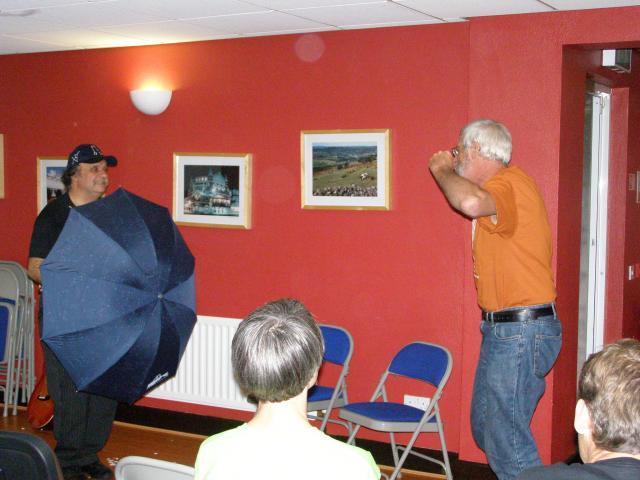
Hans-Georg Schmidt (one of the main creators
of the International Meteor Conference as a regular event)
photographed by
1. Casper ter Kuile
2-3. Adriana Nicolae
Atmospheric Responsible:
Why do you want to enter the atmosphere,
Trio Kappa Cygnid
Nastassia Smeets, Urska Pajer and Elise Ijland?
Nastassia Smeets (Belgium),
Urska Pajer (Slovenia),
and Elise Ijland (Holland):
Cygnus gives us very much power
to be a great meteor shower!
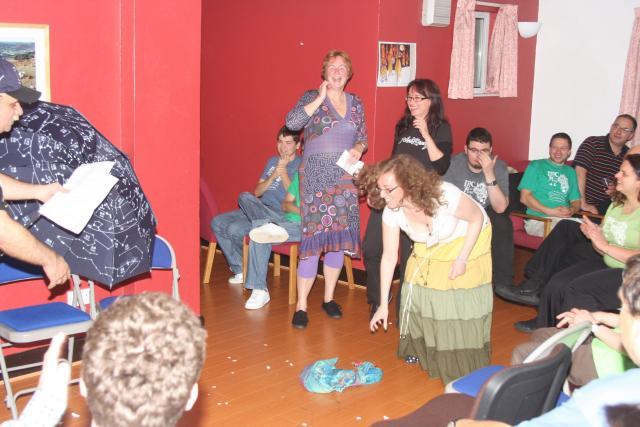
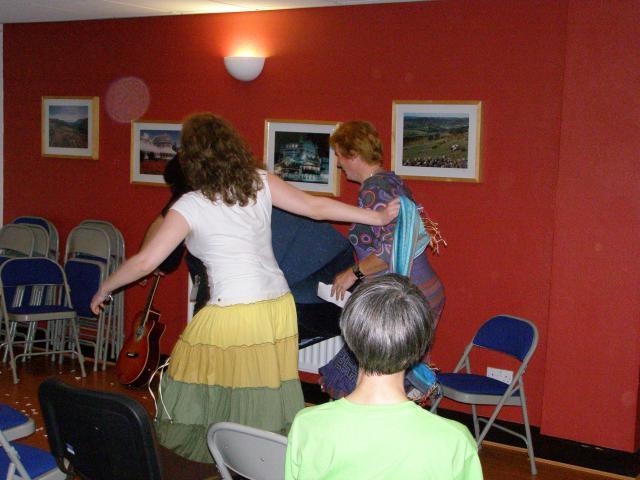
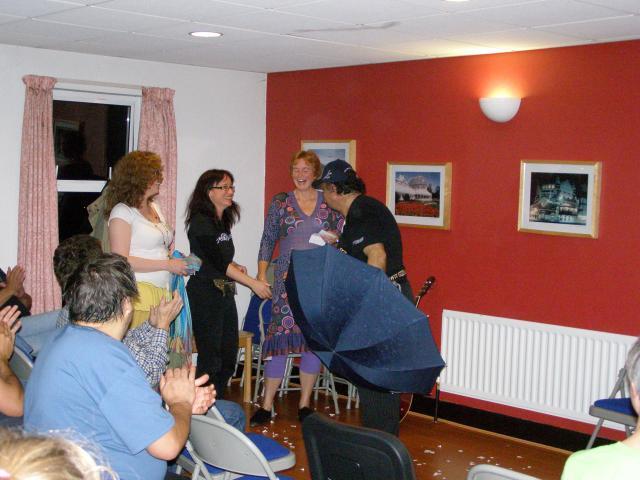
Trio Kappa Cygnid
photographed by
1. Bernd Brinkman
2-3. Adriana Nicolae
Atmospheric Responsible:
Why do you want to enter the atmosphere,
Draconid Vaibhav Savant?
Vaibhav Savant (India):
Do you know how jealous I am of my cousins,
Geminids and Perseids?
Everyone wants to look at them;
No one wants to look at me!
I, too, want my photograph, my bright shiny picture
on the cover page of WGN!
That's why I want to enter the atmosphere.
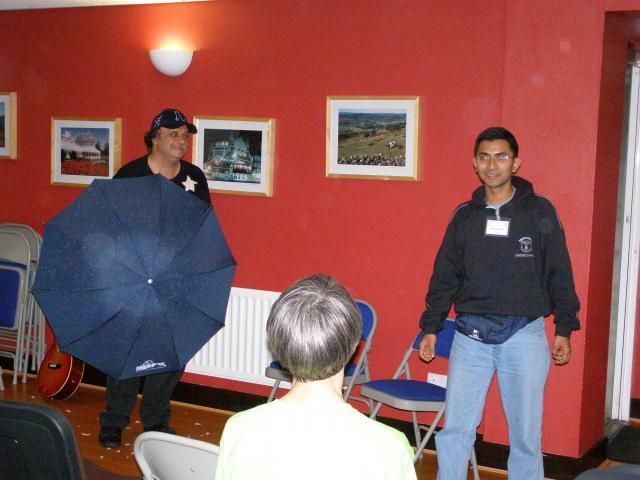
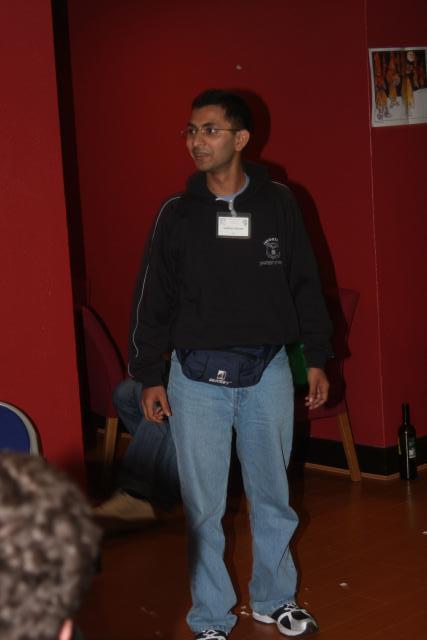
Vaibhav Savant
photographed by
1.Adriana Nicolae
2.Bernd Brinkman
Atmospheric Responsible:
Why do you want to enter the atmosphere,
Orionid Jos Nijland?
Jos Nijland (Holland):
If there was no atmosphere,
then no meteors would exist,
and because of that...
there would not be an Astropoetry Show!
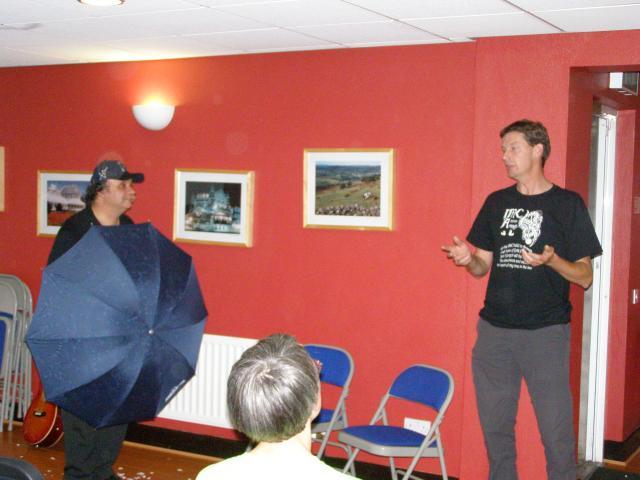
Jos Nijland
photographed by
Adriana Nicolae
Atmospheric Responsible:
Why do you want to enter the atmosphere,
Leonid Shy Halatzi?
Shy Halatzi (Israel):
Well, I didn't want to enter the atmosphere,
but David Asher predicted a meteor storm...
so I did!
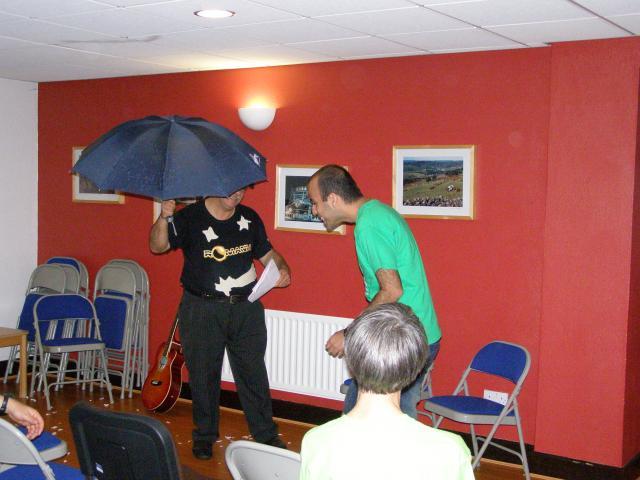
Shy Halatzi
photographed by
Adriana Nicolae
Atmospheric Responsible:
Why do you want to enter the atmosphere,
Phoenicid Megan Argo (and not Argo Navis)?
Megan Argo (Australia):
I'm a Southern stream,
and there aren't many of us -
I just like scaring the kangaroos!
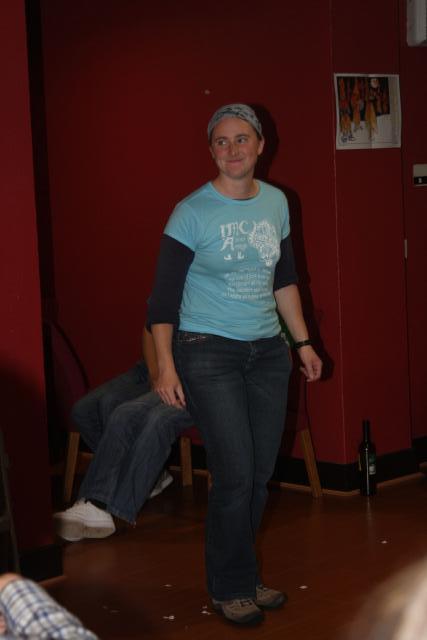
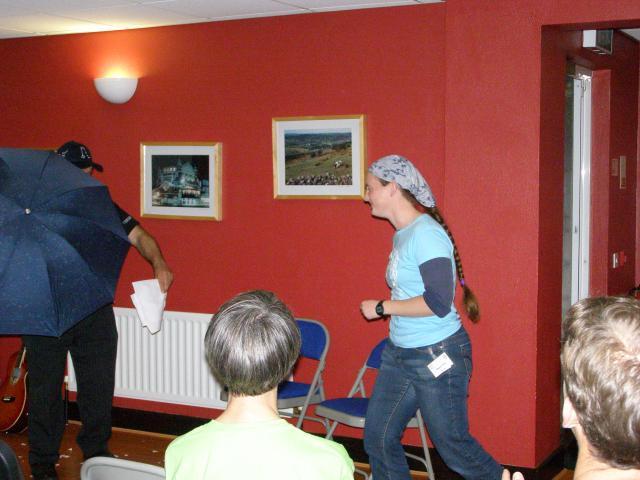
Dr. Megan Argo
photographed by
1. Bernd Brinkman
2. Adriana Nicolae
Atmospheric Responsible:
Why do you want to enter the atmosphere,
Geminid Cis Verbeeck?
Cis Verbeeck (Belgium):
Traveling so long around the Sun,
I'm dying of thirst.
Now I want to go to Armagh,
to have a Guinness at the bar!
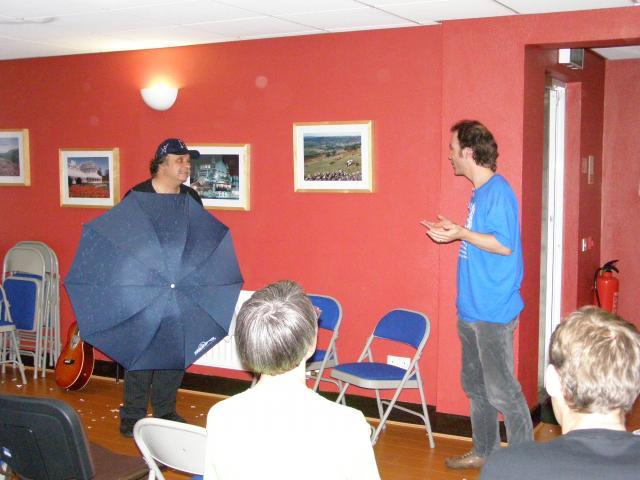
Cis Verbeeck
photographed by
Adriana Nicolae
Then Andrei Dorian Gheorghe ended
by singing:
Fellows, this night we have to drink, so let’s go,
Because this was the Astropoetry Show!
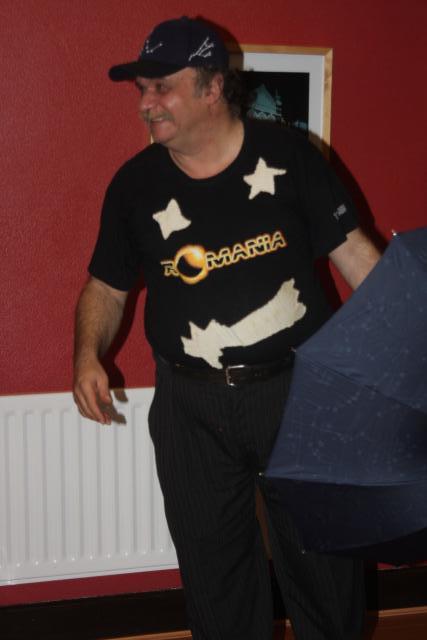
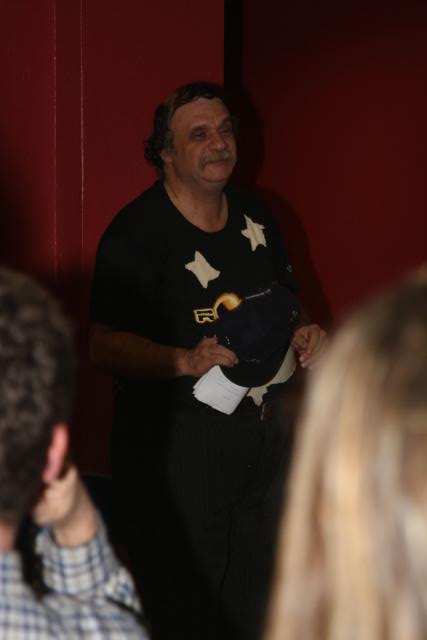
Andrei Dorian Gheorghe
photographed by
Bernd Brinkman
*
An essential conclusion of this web project is that
it has expanded the Astropoetry Show concept by putting together
the hosts’ astroartistical contribution,
the astro-photo-art-poetry posters
and the international spectacle
as a continuatuion (enriched by images)
of the former Meteor Contemporary Poetry Project.
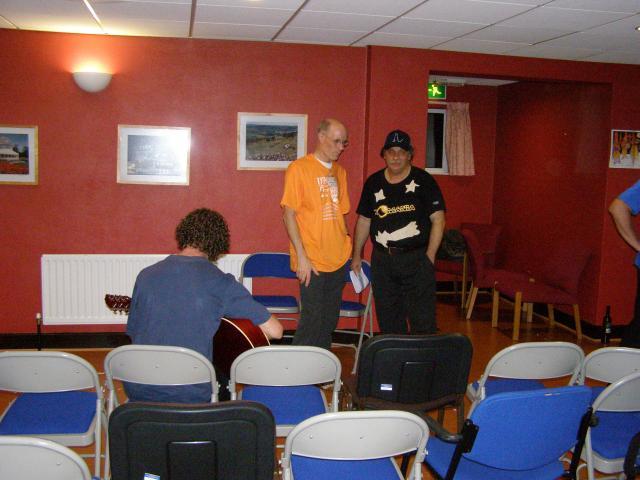
Casper ter Kuile and Andrei Dorian Gheorghe breathe after the Astropoetry Show
while Alexandru Tudorica (Romania) plays guitar
Photo: Adriana Nicolae
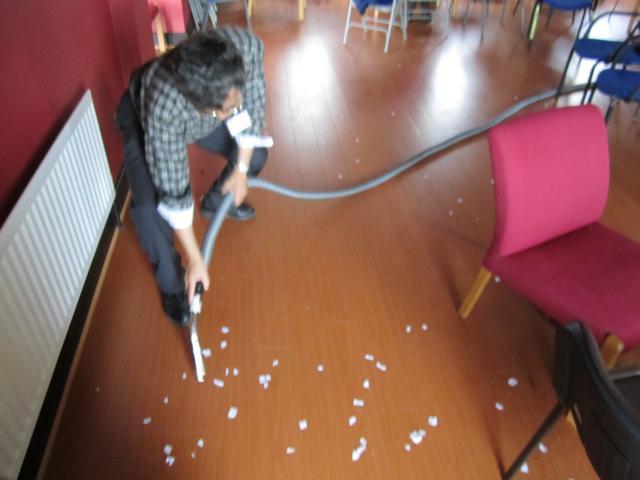
The noblest volunteer, Nagatoshi Nogami, cleans the “meteoritic dust”
left by the Astropoetry Show
Photo: Geert Barentsen
*
But maybe the best conclusion
belongs to one of the IMC 2010 participants
who has travelled the farthest:
THOUGHTS ON IMC 2010
For me, it is so fine to be here
As you know I have come from so many kilometers away,
I met so many friends in Armagh
and hope sometime you come to assist with Perseids on Gran Savannah
Mr. Nagatoshi had just said, me?
Who else could it be?
I´m glad to get into the IMO website
Let´s go all into dark skies, but also into the dark side!!!
For Closing I want to thank everyone
For all beers I drank
Wishing you the best of all
We have demonstrated that every country’s borders are about to fall !!!
I am a meteor and I want to be reported in the IMO website
Let´s go all into the dark sky!!!
-Rafael Barrios (Venezuela)-
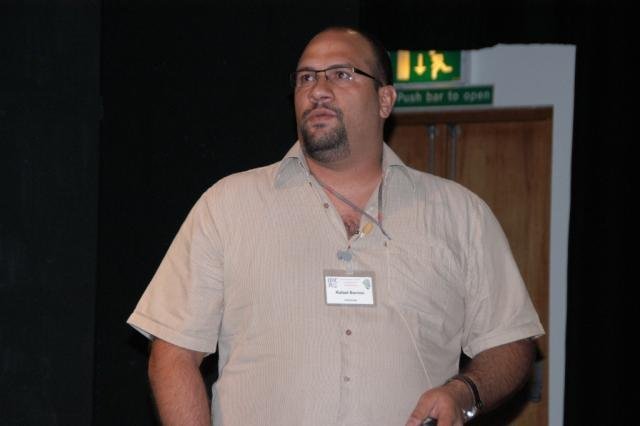
Rafael Barrios during the IMC 2010
*
Finally, the organizers of this web site cannot find ways to express
their gratitude to the IMC 2010 organizers and participants.
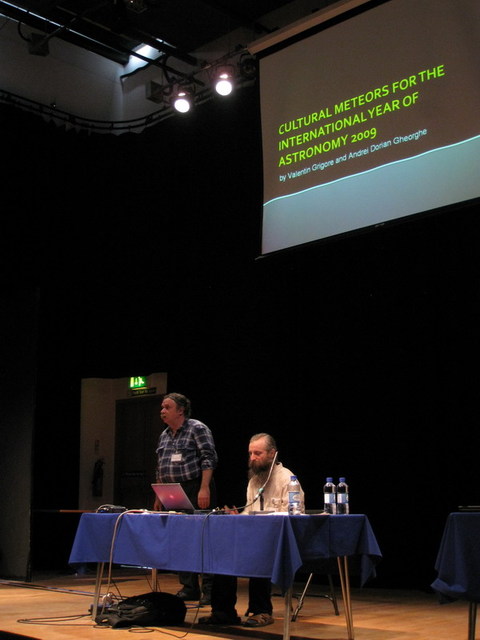
Andrei Dorian Gheorghe and Valentin Grigore
during their IMC 2010 lecture
Photo: Casper ter Kuile
Just an imperfect limerick and a modest symbolical photograph.
Dear IMC 2010 Friends!
All I can say to you is: Cheers!,
For I have no fear
As a teddy bear
To drink for you a few more beers.
-Andrei Dorian Gheorghe-
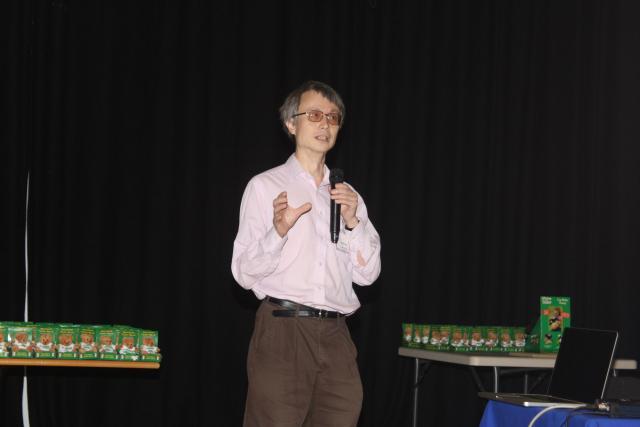
David Asher, co-organizer and the most beloved hero of the IMC 2010,
surrounded by teddy bears
Photo: Valentin Grigore
*
HOME